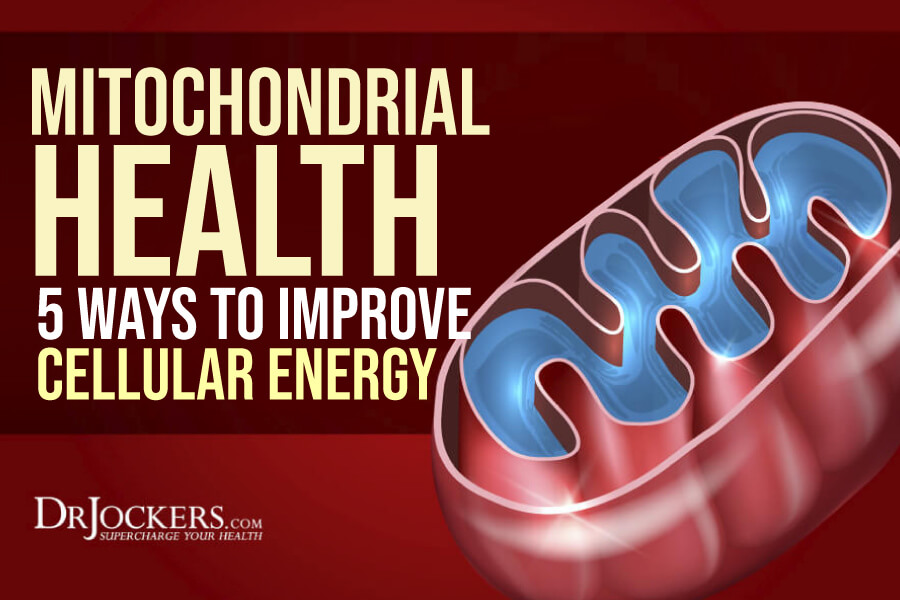 Mitochondrial Health: 5 Ways to Improve Cellular Energy
Mitochondrial Health: 5 Ways to Improve Cellular Energy
Mitochondrial health is one of the most important and rarely discussed factors in your health and energy. The mitochondria are the powerhouse of your cells that serve a variety of functions and which help to create health in your body.
However, mitochondria are highly sensitive to damage. When they are compromised and not working properly, you may develop a number of health problems.
Poorly functioning mitochondria can result in fatigue, memory loss, cognitive decline, heart disease, diabetes, muscle aches and pain, digestive problems, respiratory problems, and an array of other symptoms as well as an increased risk of all forms of chronic disease.
In this article, I want to share with you what mitochondria are, their major functions, the symptoms of mitochondrial problems and potential causes of these problems. You will learn about the best lab test out there to identify mitochondrial issues. Most importantly, you will learn some effective strategies to improve your mitochondrial health and cellular energy.
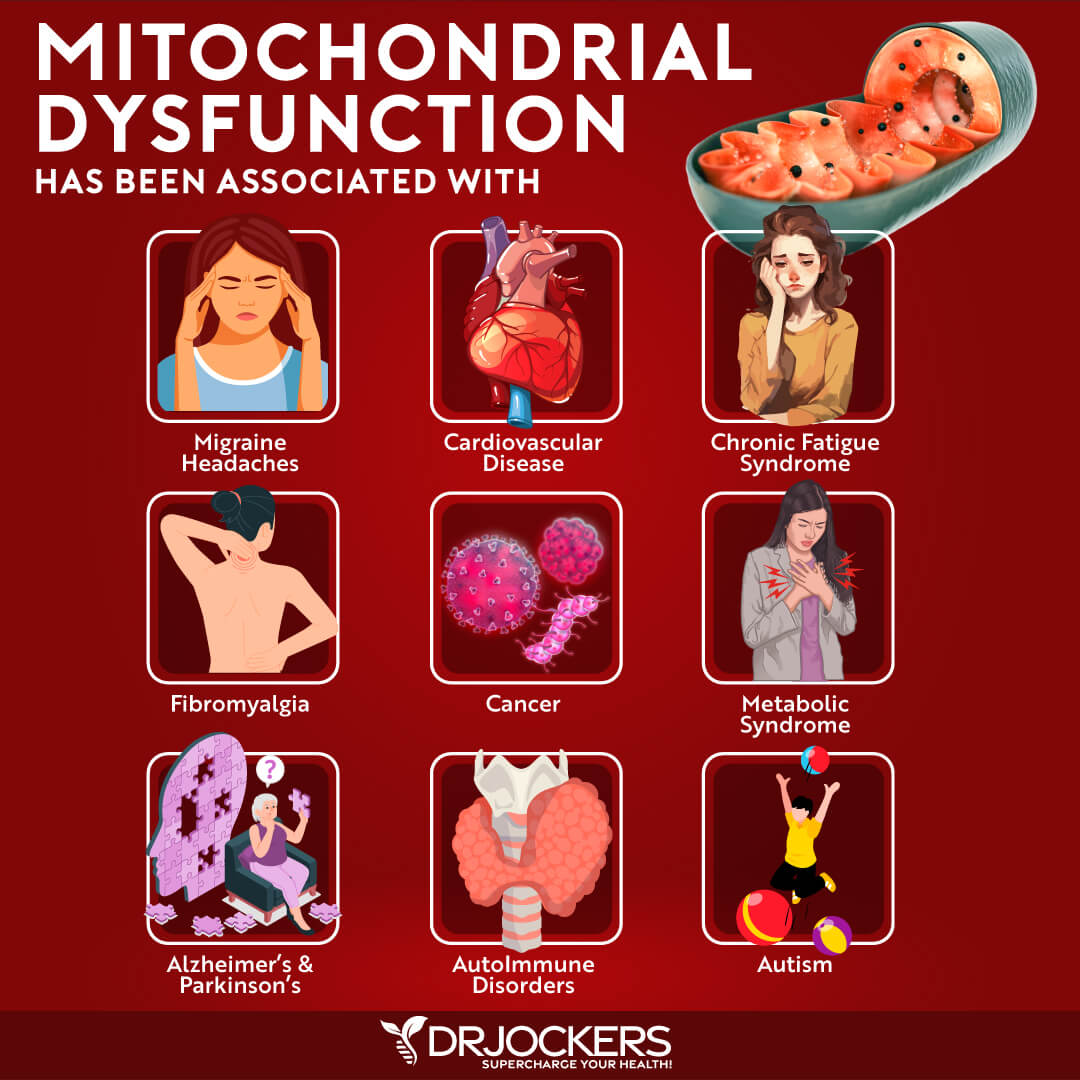
What Are Mitochondria
Mitochondria are specialized structures found in every cell of the human body with the exception of red blood cells. Mitochondria contain their own DNA.
Mitochondria are basically the powerhouse of your cells that serve as batteries to power a variety of functions in your body. They are responsible for generating 90% of cellular energy in the form of adenosine triphosphate (ATP) and for assisting metabolic functions.
Mitochondria are located in differing concentrations in various tissues throughout the body and are designed to serve the purpose of those specific tissues. For example, the mitochondria in your liver help to convert ammonia into a less toxic waste substance (1, 2).
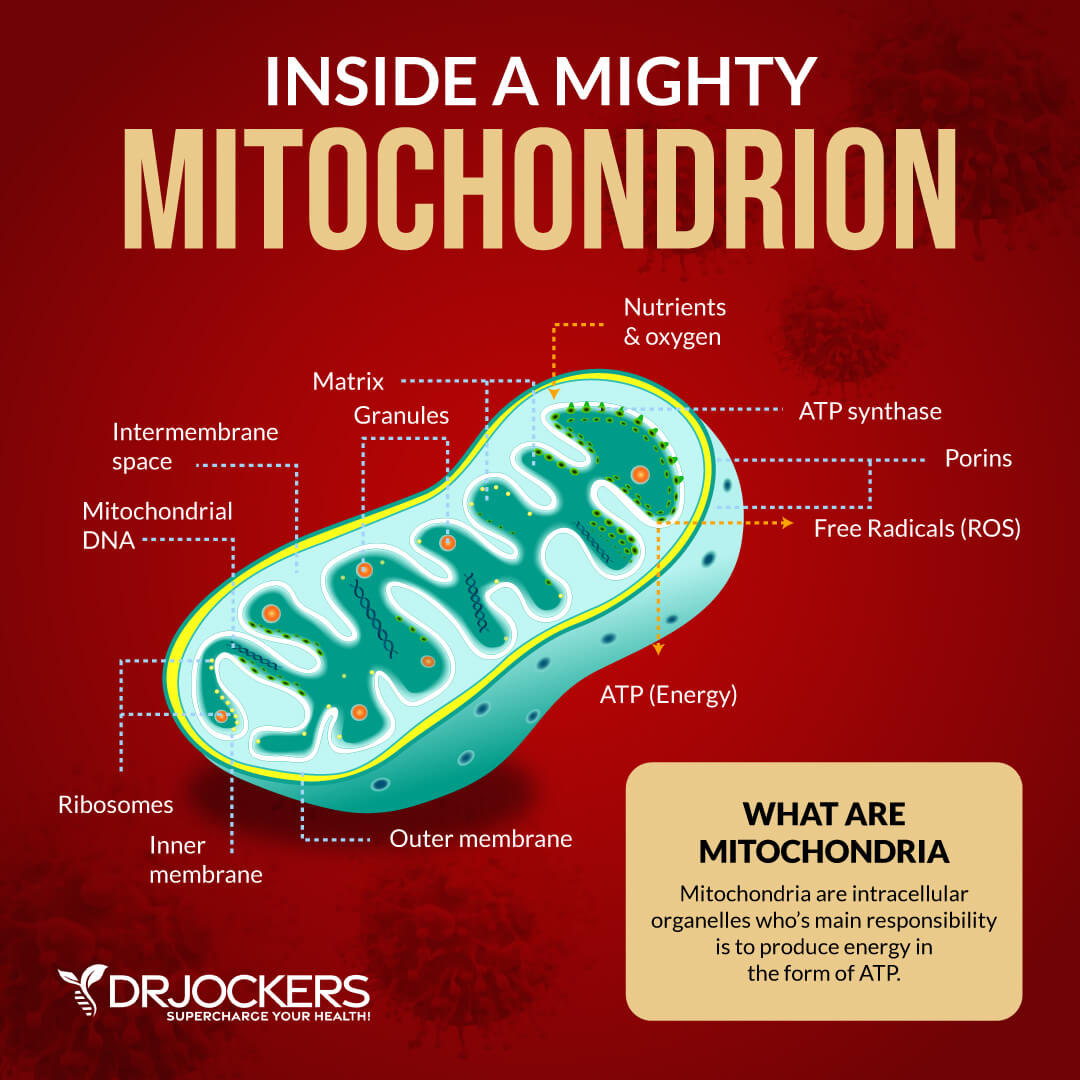
Major Functions of the Mitochondria
The two main functions of the mitochondria include cellular respiration and energy production. These two functions are the main reason you need to both breathe and eat. Your mitochondria require both oxygen from air and glucose and fat from food in order to generate energy in the form of ATP (3).
Besides energy production and cellular respiration, the mitochondria play a role in other functions, including calcium homeostasis, cell growth, and cell death. Let’s look at the major functions of the mitochondria one by one.
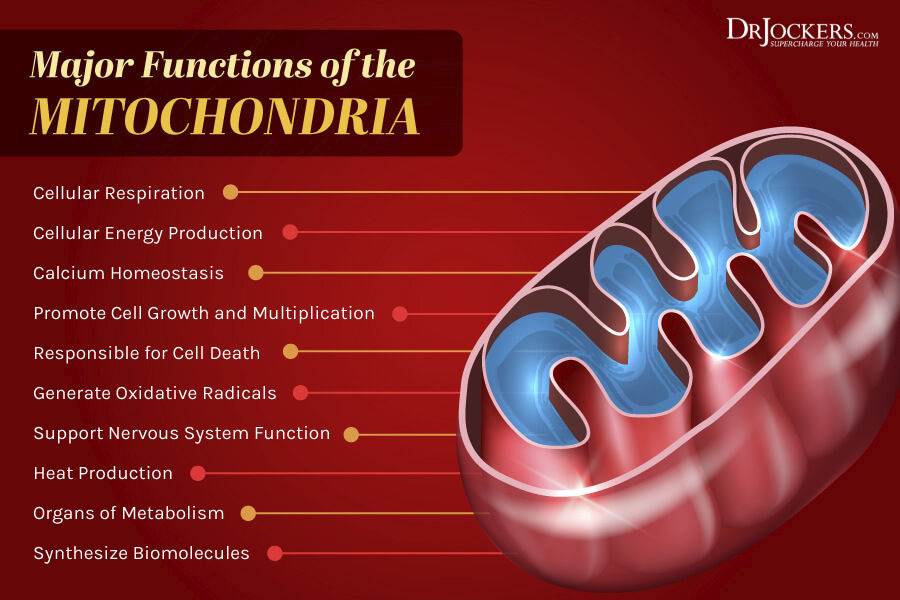
Cellular Respiration
The mitochondria are responsible for cellular respiration. When you inhale, oxygen gets transferred from your lungs to your cells through your blood. Once the mitochondria of your cells use up the oxygen, carbon dioxide is released from your cells. This carbon dioxide finds its way back to your lungs to be released into the air through exhalation.
Cellular Energy Production
Your cells need energy for a variety of purposes, including DNA, RNA, cell division, and protein synthesis. Most of these processes happen through bond formation and with the involvement of enzymes and phosphates that require cellular energy supplied by the mitochondria.
The mitochondria produce energy as ATP by oxidative phosphorylation through breaking down carbohydrate substrates. The food you eat gets digested and absorbed into the blood as glucose supplying energy to your cells. Later, this glucose is broken down to release energy.
ATP is a complex organic chemical that powers metabolic processes in your body. It is the molecular currency of intercellular energy transfer. ATP is produced in the mitochondria by going through the Krebs cycle.
The Krebs cycle is also called the citric acid cycle or the tricarboxylic acid (TCA) cycle. It is an essential part of cellular respiration. The Krebs cycle is a biological process that is responsible for manufacturing energy through a series of chemical reactions. It produces a chemical called nicotinamide adenine dinucleotide (NADH), which is necessary for enzymes embedded in the cristae, which is a fold in the inner membrane of the mitochondria that produces ATP. Energy is stored as chemical bonds in the ATP molecules and can be used when these bonds are broken.
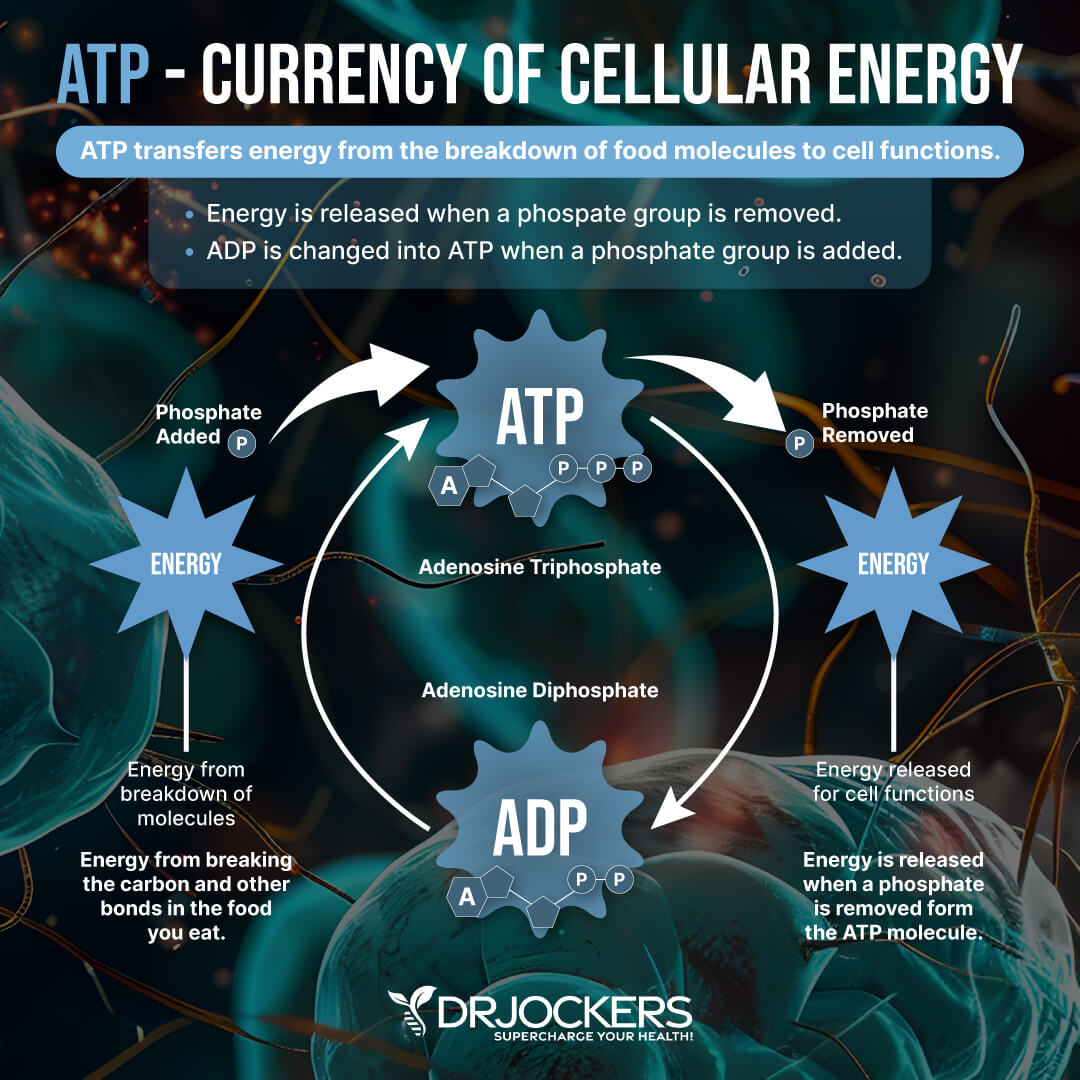
Calcium Homeostasis
The mitochondria play an important role in calcium homeostasis inside your cells. Your cells receive calcium through the cell membrane and store them in calcium vesicles. With the help of the mitochondria, calcium is released and stored when required. Calcium is essential for regulating cellular metabolism, hormone function, fertilization, muscle function, blood clotting and more (4).
Promote Cell Growth and Multiplication
The mitochondria are essential for cell growth and multiplication. They help to enhance protein synthesis. Cyclin is a specific protein that acts as a checkpoint protein to ensure that cell division happens at the right time.
Responsible for Cell Death
Your cells don’t live forever. The mitochondria play an important role in apoptotic, or programmed cell death when injuries or irreversible damage occurs to a cell. A disruption of the functioning of mitochondria may also lead to the end of energy supply and cell death.
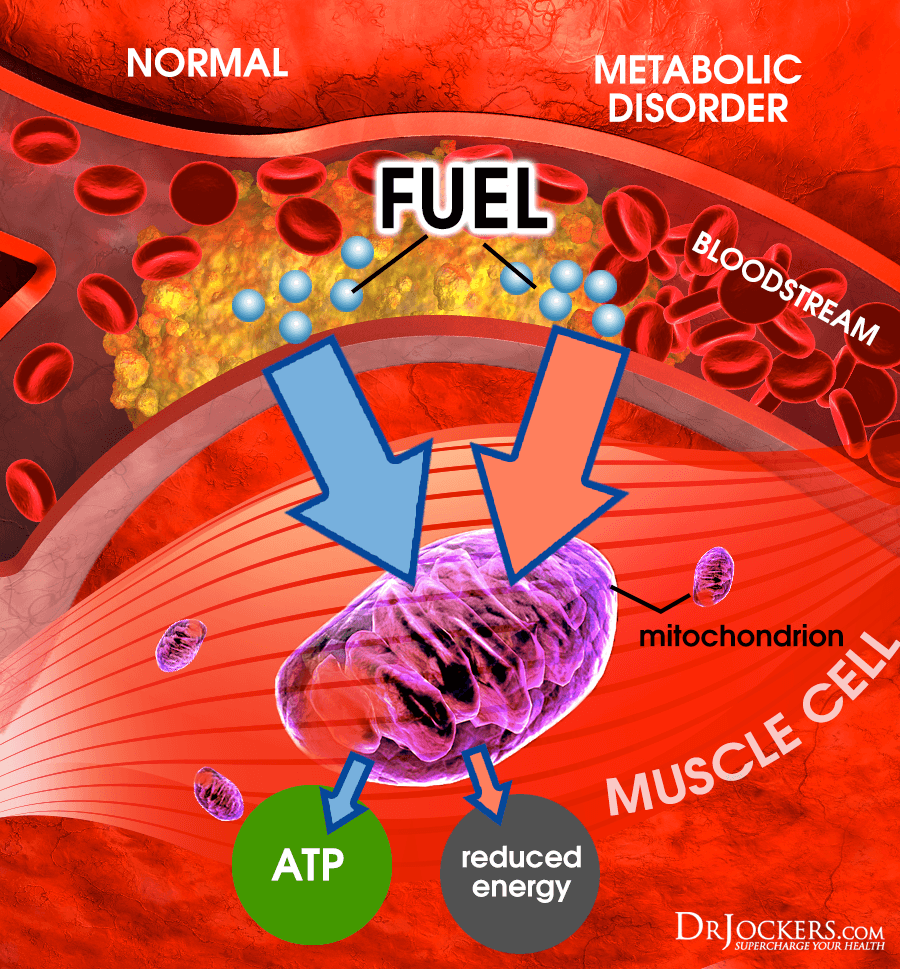
Generate Oxidative Radicals
The mitochondria create oxidative radicals during energy production which are responsible for the role of aging and a variety of other reactions in the body.
Support Nervous System Function
There are several mitochondria found around synapses and other parts of nerve endings that support neurotransmitter release, energy production, and the release of calcium into the cytoplasm.
Heat Production
One of the ways your body generates heat to keep you warm is by using a tissue called brown fat. The mitochondria generate heat through non-shivering thermogenesis during a process called proton leak using brown fat. Babies have the highest level of brown fat in humans since they are the most vulnerable to cold (5).
Organs of Metabolism
The mitochondria play an important role in metabolic functions, the Krebs cycle, and other respiratory cycles.
Synthesize Biomolecules
The Krebs cycle has several by-products, including glutarate and glycol-oxalic acid. They end up forming glutamine and glycine which are amino acids necessary for your health.
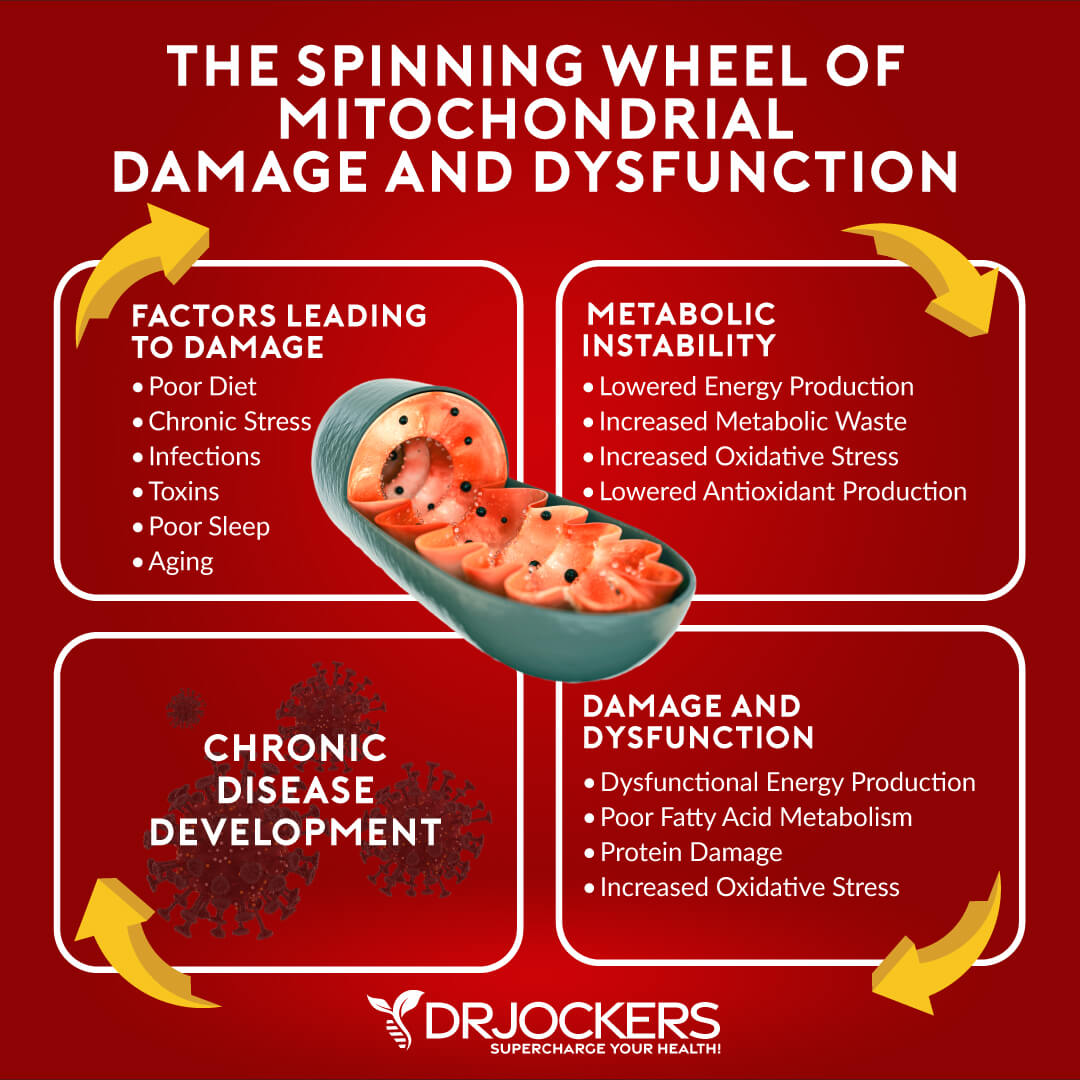
Symptoms of Mitochondrial Problems
There may be various symptoms of mitochondrial health problems depending on the person and which organs the mitochondrial issues affect. Symptoms become more noticeable when there are many damaged cells suffering from mitochondrial damage in one organ (6, 7).
In some cases, mitochondrial problems only affect one single organ or one group of tissues. In other cases, they may affect multiple organs and entire systems. Those who have a mitochondrial DNA (mtDNA) mutation may experience a cluster of symptoms that relate to a specific syndrome (7).
Though they may present at birth, mitochondrial problems and diseases can develop at any age. Mitochondrial diseases may affect any cells and any part of your body, including the cells of your heart, kidneys, liver, pancreas, muscles, brain, nerves, eyes, or ears. A variety of conditions, including Alzheimer’s disease, diabetes, cancer, muscular dystrophy, and Lou Gehrig’s disease, can lead to secondary mitochondrial dysfunction without the existence of primary mitochondrial disease and related symptoms (7).
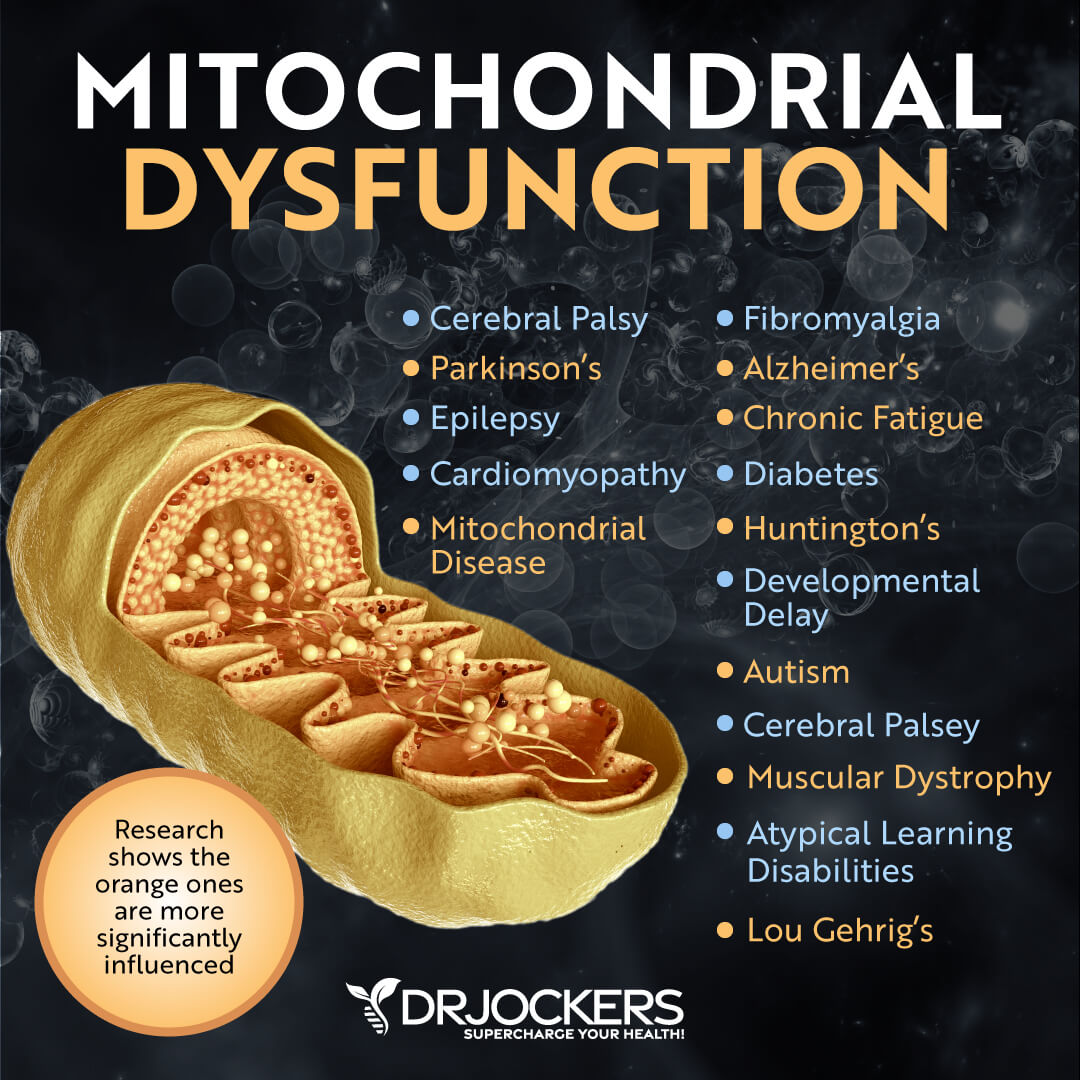
Symptoms of Mitochondrial Problems May Include (7):
- Fatigue
- Loss of motor control, coordination, or balance
- Trouble talking
- Trouble walking
- Digestive problems, such as vomiting, diarrhea, constipation, and acid reflux
- Muscle aches, pains, and weakness
- Cardiovascular problems and heart disease
- Liver disease or dysfunction
- Kidney disease
- Neurological problems
- Trouble eating and swallowing
- Stalled growth and development
- Respiratory problems
- Migraines
- Lactic acidosis
- Vision loss and other visual issues
- Trouble hearing
- Hormonal disorders, such as lack of estrogen or testosterone
- Higher susceptibility to infections and illness
- Autism, and autism-like problems
Main Causes of Mitochondrial Problems
Mitochondrial problems may develop for a variety of reasons, including genetic issues, toxin exposure, chronic infections, and poor lifestyle habits. Let’s look at the main causes of mitochondrial health problems one by one.
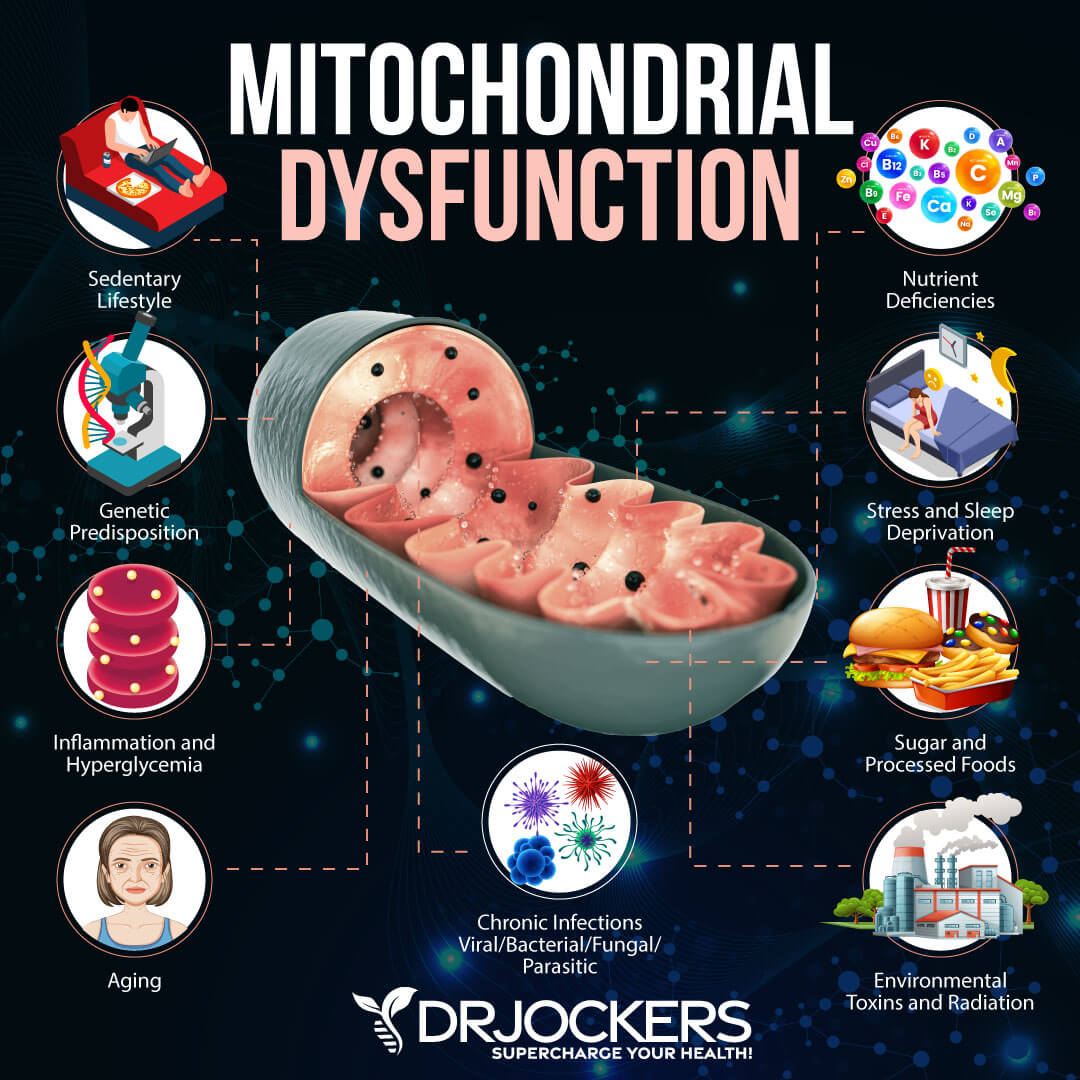
Genetic Issues
In most people, the main cause of mitochondrial health problems and primary mitochondrial disease is an inherited genetic condition. It can be inherited in various ways from parents to children.
Your genes are substances that give you your traits, for example, the color of your eyes and your body shape. Your genes contain your DNA. Your DNA is basically a blueprint of your unique makeup (7).
Under normal circumstance, children inherit one gene from their father and one from their mother. However, when a child has a mitochondrial disease, they don’t receive a normal pair of genes, but one or both genes are mutated in some way.
Gene inheritance types include:
- Autosomal recessive inheritance: This means that the child gets one mutated copy of a gene from each parent. This also means that there is a 25 percent chance for each child in the family to inherit a mitochondrial disease.
- Autosomal dominant inheritance: In this case, the child receives one mutated copy from either parent. This results in a 50 percent chance that each child ends up with an inherited mitochondrial disease.
- Mitochondrial inheritance: Each mitochondrion contains its own DNA. Some mitochondrial disorders are caused by mutation exclusively inherited from mothers, which also means that all children in the family will inherit a mitochondrial disease with 100 percent certainty.
- Random mutations: Random mutations can develop in genes without being inherited from a parent.
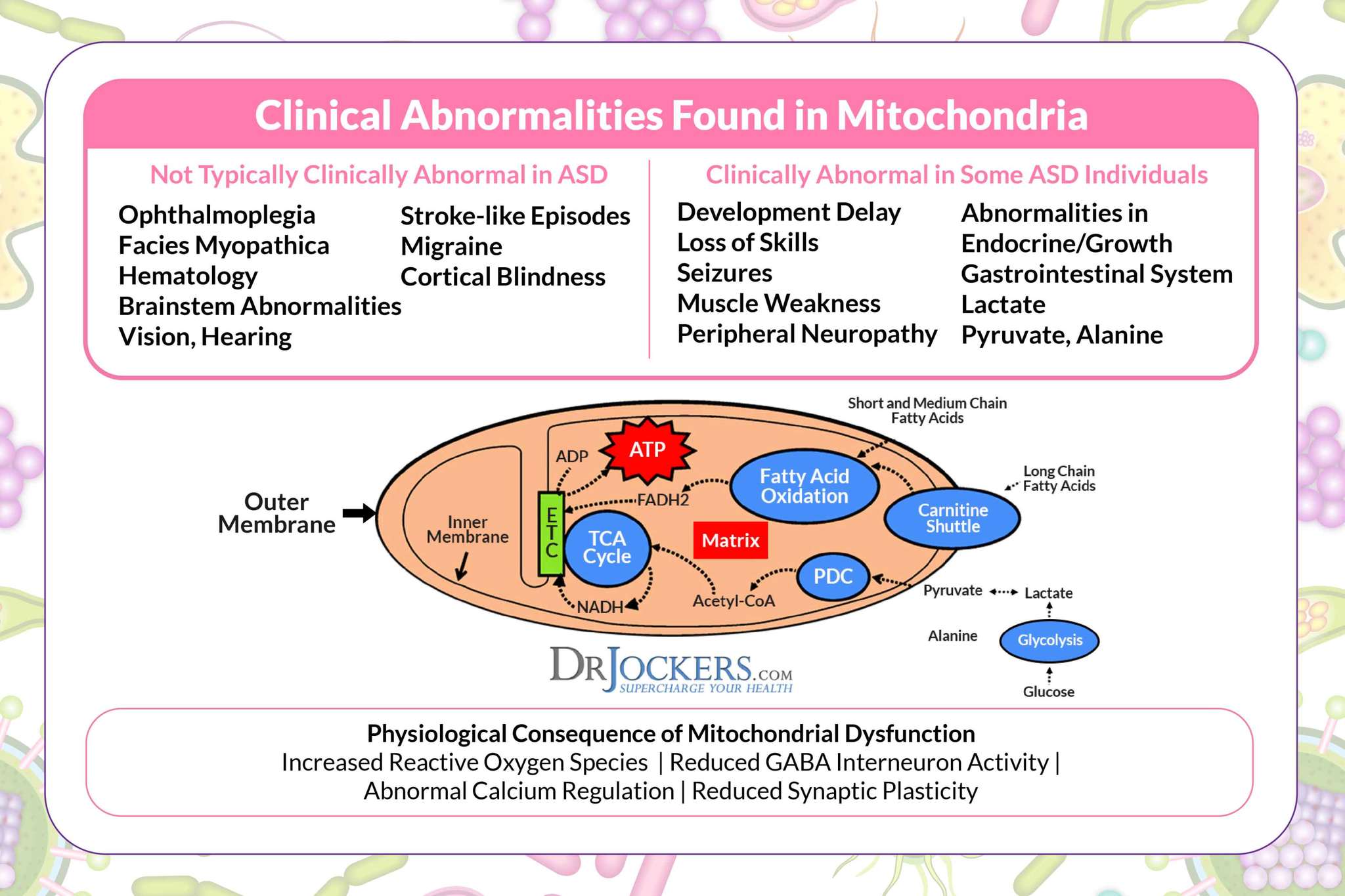
Toxin Exposure
Environmental toxins are an increasingly recognized cause of a variety of health issues, including inflammation, autoimmune conditions, and cancer. Exposure to environmental toxins can contribute to chronic oxidative stress and increase your risk of mitochondrial health problems.
Unfortunately, our world, including our homes are full of toxins. You may find toxic chemicals in conventional cleaning, body, and beauty products. Exposure to mold in your home can lead to serious health issues. Smoking, toxic candles, and air pollution also increase your risk of disease.
Consuming non-organic food may increase your risk of chemical exposure as can pesticides, artificial ingredients, additives, and GMOs. You may be exposed to toxic heavy metals from pesticides and dental amalgam fillings with mercury.
Furthermore, the technological conveniences of modern life, including cell phones, computers, WI-FI routers, and various appliances send out a stream of invisible waves that may pose danger to your health. Electromagnetic fields (EMFs) may be carcinogenic and otherwise dangerous to your health. They may result in mitochondrial problems and health issues (8).

Chronic Infections
Infections are invasions by pathogens, such as viruses, bacteria, fungi, and parasites that lead to damage in the body. Acute infections are usually fought off by your immune system and resolve within a relatively short period of time. For example, with proper treatment you can recover from an ear infection, respiratory infection or infected wound within a week or a few weeks. However, chronic infections are not resolved by your immune system and stick around for several months, even years, causing a variety of health problems.
The most common chronic viral infections include the Epstein-Barr virus, hepatitis, and herpes. The most common bacterial infections include bladder and urinary tract infections. In the past, some chronic bacterial infections led to dangerous epidemics, including the plague. The most common form of chronic fungal infections includes Candida overgrowth.
Chronic infections can lead to oxidative stress, chronic infections, and a compromised immune system. They have been linked to mitochondrial problems, chronic health issues, and disease, including digestive troubles and autoimmune disorders (9, 10, 11, 12).
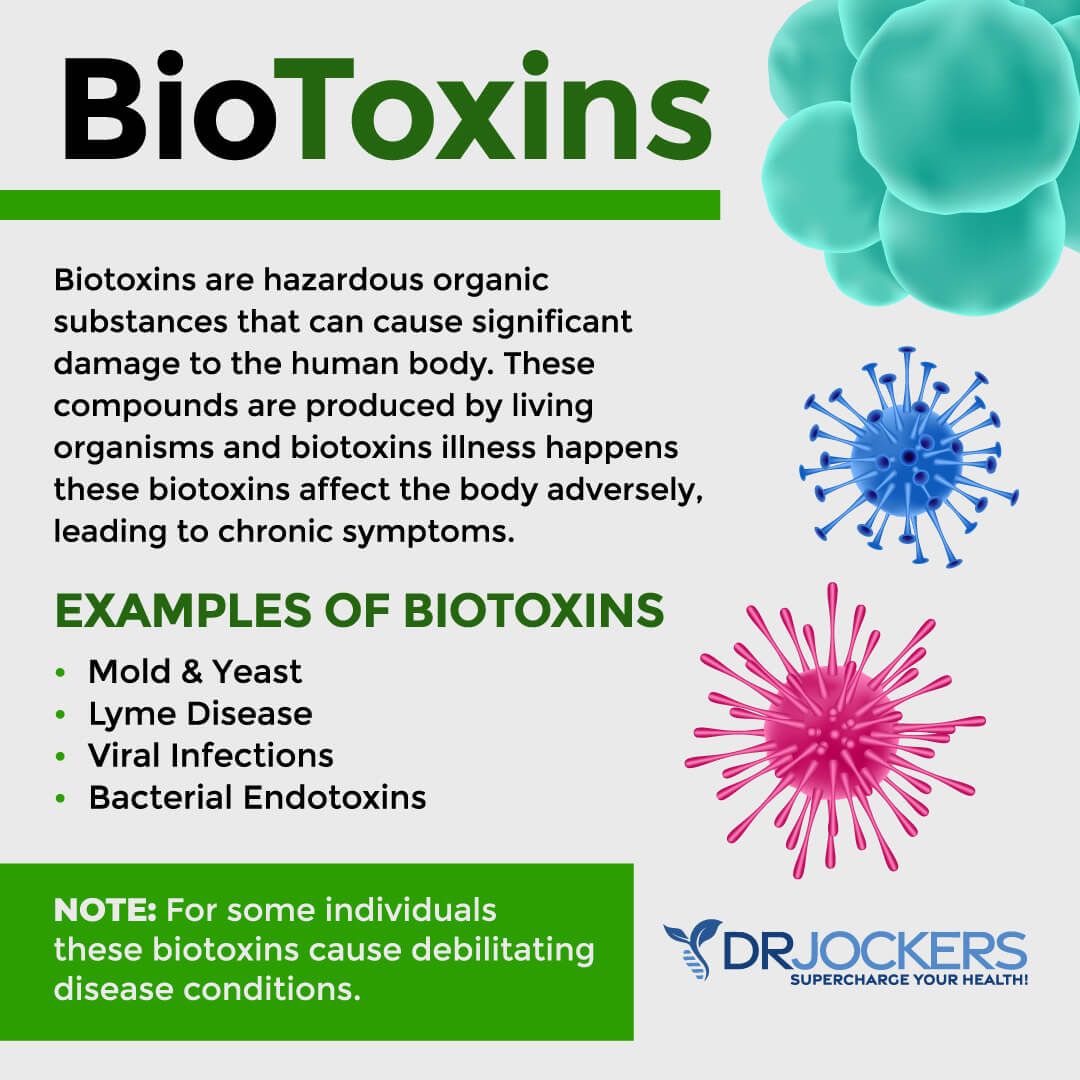
Poor Lifestyle Habits
When your body metabolizes food in the mitochondria it uses oxygen. During this process, your body also produces waste in the form of free radicals which results in oxidation. To avoid oxidative and mitochondrial damage, you need to eat plenty of antioxidants.
If your diet is filled with inflammatory foods and empty calories from refined sugar or processed foods and/or low in antioxidant-rich greens, vegetables, and fruits, then too many free radicals are produced which in turn results in inflammation, cellular and tissue damage, and mitochondrial problems.
Besides a poor diet, other poor lifestyle choices, such as poor sleeping habits, a lack of exercise and chronic stress can increase your risk of inflammation, oxidative damage, and mitochondrial problems. Your mitochondria are the powerhouse of your cells and your life force. When poor lifestyle habits lead to damage within this life force, it can result in uncomfortable symptoms and serious health problems.
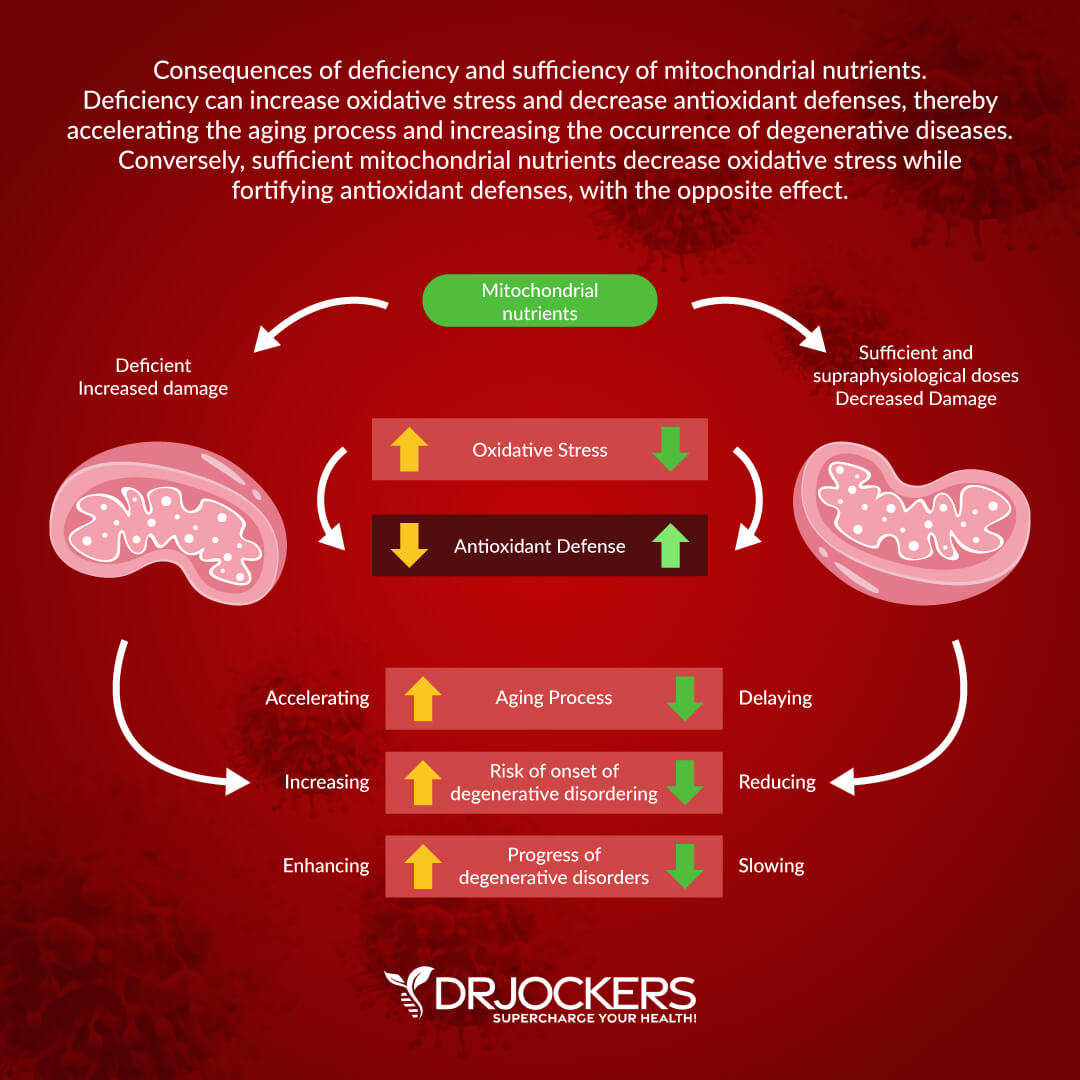
Lab Testing
If you are experiencing symptoms of mitochondrial problems, I highly recommend getting a comprehensive Organic Acid Test (OAT) done to look for biomarkers of Kreb Cycle Dysfunction. I absolutely love this test, because it provides so much information, including neurotransmitter factors, oxidative stress, gut health, methylation factors, and more within one simple test.
If you don’t like needles, this test is perfect for you. It is a simple urine test that looks at complex biomarkers from various metabolic pathways.
These organic acid biomarkers are metabolic intermediates that are produced in pathways of central energy production, neurotransmitter breakdown, detoxification, and intestinal microbial activity. When specific organic acids are found accumulating, they often signal a metabolic insufficiency that may be related to nutritional deficiency, toxicity or an inherited enzyme deficit.
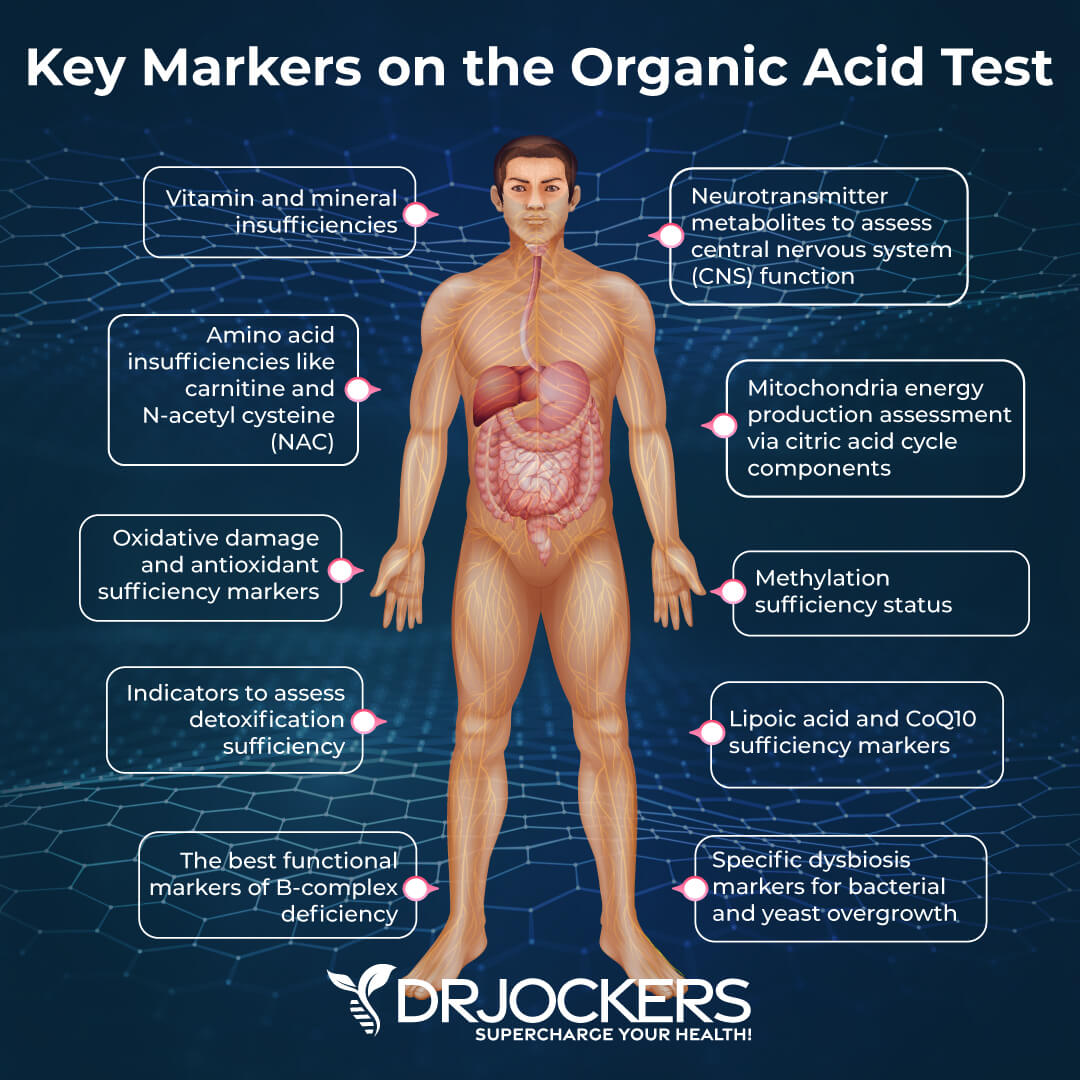
Biomarkers That The OAT Measures Include:
- Mitochondrial energy production assessment via citric acid cycle components
- Neurotransmitter metabolites to assess central nervous system (CNS) function
- Vitamin and mineral insufficiencies
- Amino acid insufficiencies, such as carnitine and N-acetyl cysteine (NAC)
- Oxidative damage and antioxidant sufficiency markers
- Indicators to assess detoxification sufficiency
- The best functional markers for b-complex deficiency
- Lipoic acid and Coenzyme Q10 (CoQ10) sufficiency markers
- Specific dysbiosis markers for bacterial and yeast overgrowth
- Methylation sufficiency status
Strategies to Improve Mitochondrial Health
Using some simple and natural strategies, you can improve your mitochondrial health and reduce the risk of mitochondrial problems and symptoms. My five favorite dietary and lifestyle strategies include a nutrient-rich nutrition plan, regular exercise, reducing stress, improving sleep, intermittent and extended fasting, and using key mitochondrial support nutrients.
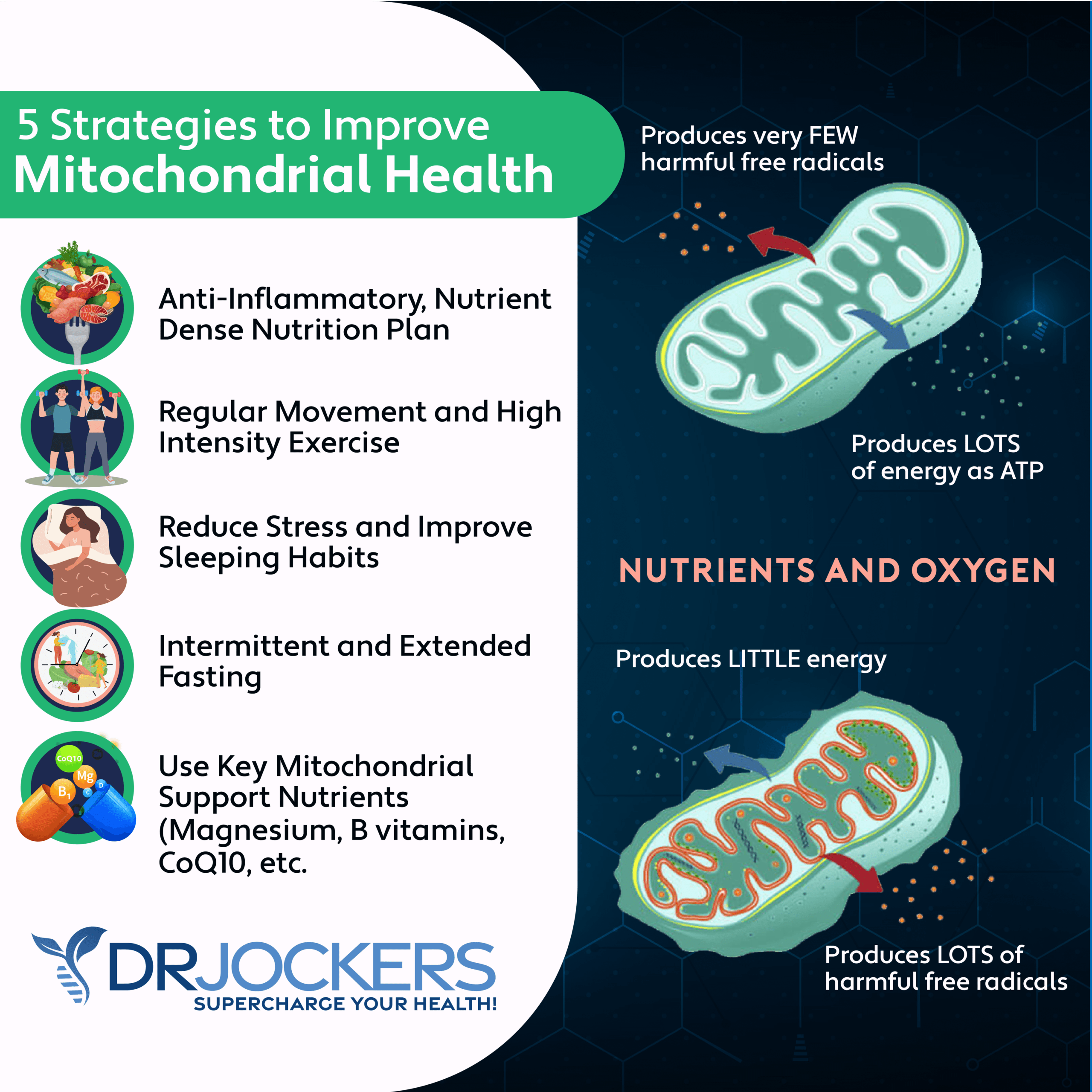
Nutrient-Rich Nutrition Plan
As you’ve learned earlier, a diet high in refined sugars, processed foods, and other inflammatory foods can lead to inflammation, oxidative stress, mitochondrial problems, and disease. Switching to a nutrient-rich nutrition plan can improve your mitochondrial function, lower inflammation, decrease oxidative damage, and reduce your risk of health problems.
Eliminate inflammatory foods, such as refined sugar and carbs, bad fats, gluten, casein, and artificial ingredients from your diet. Eat plenty of greens, vegetables, herbs, and fruits that are rich in antioxidants, vitamins, and minerals. Fill up on healthy fats, such as avocados, coconut oil, coconut butter, grass-fed butter and ghee, MCT oils, and organic pasture-raised eggs. Focus on clean proteins, such as grass-fed beef, wild-caught salmon, pasture-raised poultry and wild game.
Organ meats, including liver, heart, tongue, kidney, brain, intestines, bones and tendons can be particularly beneficial when it comes to mitochondrial health. For example, the heart is rich in CoQ10 enzymes which are incredibly beneficial to your mitochondria by reducing oxidative stress and improving energy production.
Organ meats, such as liver and kidneys are rich in vitamin B12 that is necessary for healthy nerve function, memory, mood, and energy. Liver and cod liver is high in vitamin D which is essential for your immune system. Organ meats are high in omega-3 fatty acids that can fight inflammation effectively. They are also rich in healthy protein, iron, B vitamins, and other water-soluble vitamins, such as A, D, E, and K. You can learn more about the benefits of specific organ meats here (13).
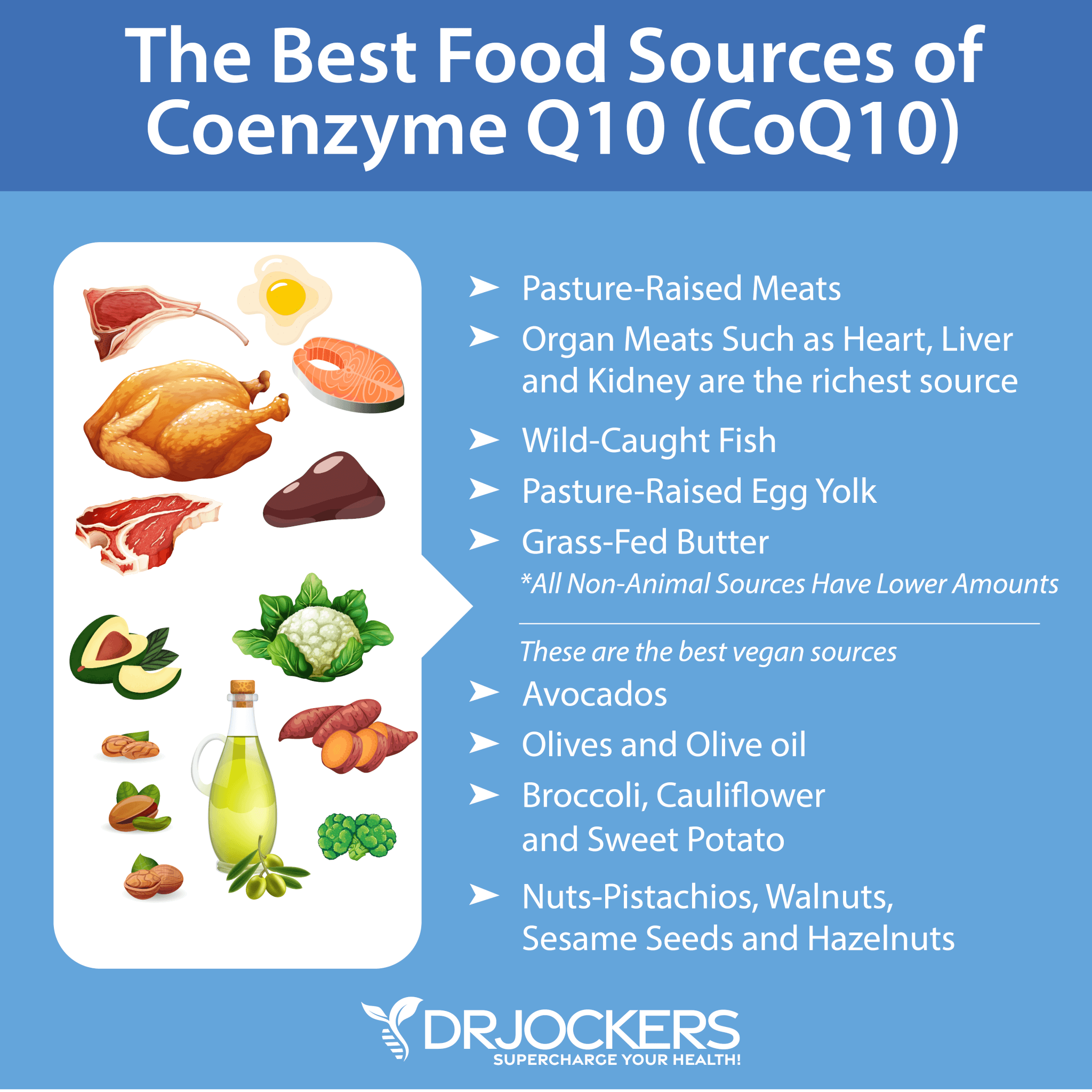
Ketogenic Diet Improves Mitochondria
To reduce the risk of and improve existing mitochondrial problems and to increase your cellular energy, the ketogenic or keto diet can be an excellent choice with very powerful health benefits. The keto diet is a high fat and low carb plan that uses ketones as an alternative energy source instead of glucose. If you are doing an extended fast, your body would utilize ketones as well. However, with a specific keto diet, you can achieve the same physiological state and benefits. (14).
Most of us have been using sugar (glucose) for energy our entire lives. Glucose is the energy source our mitochondria knows well and is comfortable with. When you switch to a keto diet, the initial phases of keto-adaptation act as a powerful stressor and stimulus to your mitochondria. During this transition process, old and weak mitochondria die off which stimulates the growth of new and stronger mitochondria. This process results in more energy production (15).
Research has shown that the ketogenic diet can slow the progression of a mitochondrial disease and positively influence longevity pathways. Ketogenic diets may reduce inflammation, increase mental clarity, focus, and concentration, provide you with more energy, slower aging and reduce the risk of chronic diseases. You can learn more about what to eat for a keto diet here (16, 17).
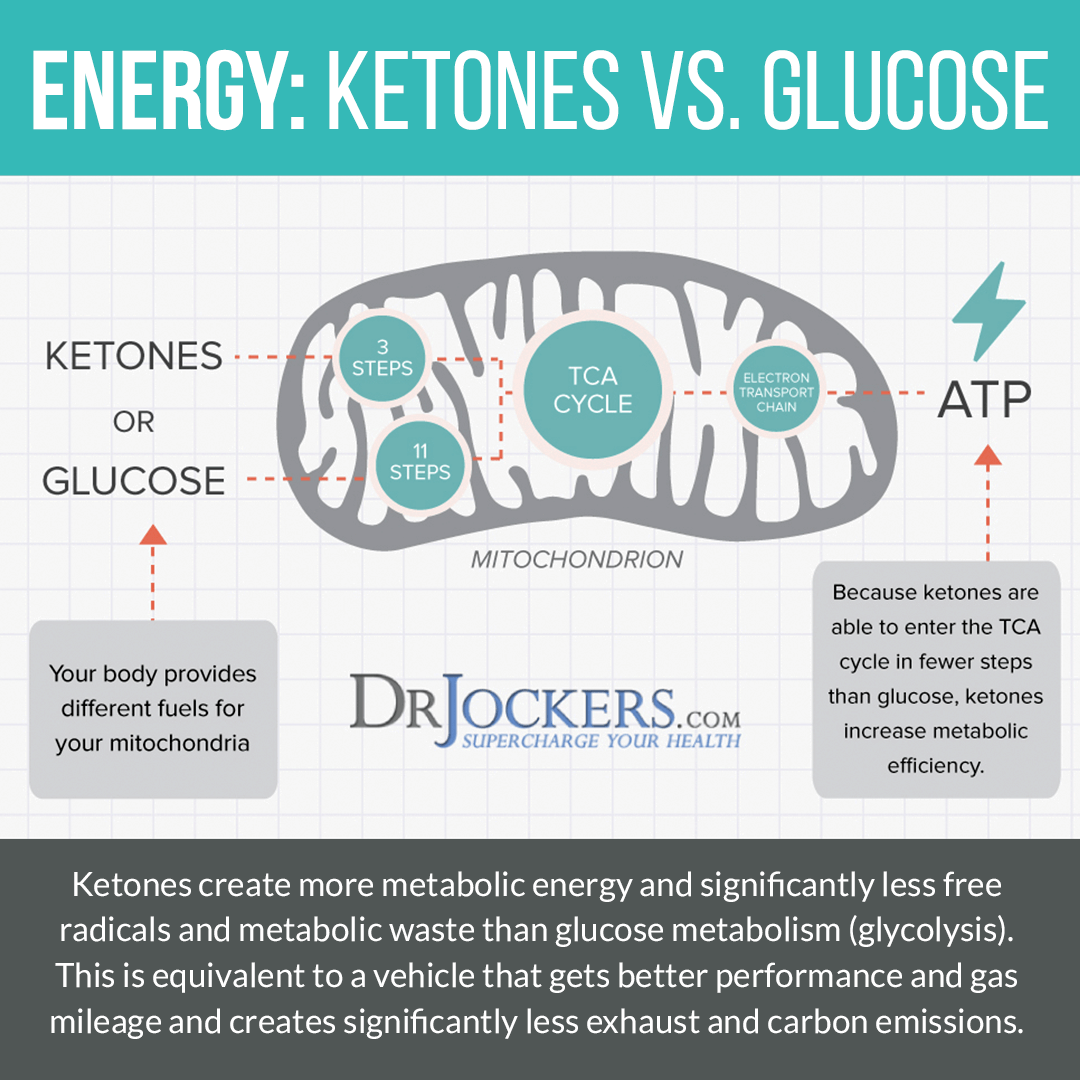
Regular Exercise
As human beings, we are meant to move our bodies for optimal health and well-being. However, an average American sits for about 13 hours a day. Considering that the recommended duration of sleep is 7 to 8 hours, it means that the average person spends 20 to 21 hours in a lying or sitting position (18).
However, regular exercise can improve mitochondrial health, maintain your muscle tone, improve your sleep, boost your immune system, better your cognitive abilities, and increase your lifespan. Aerobic exercise, in particular, can help change the mitochondrial shape, aid mitochondrial repair and promote the balance of mitochondrial cells.
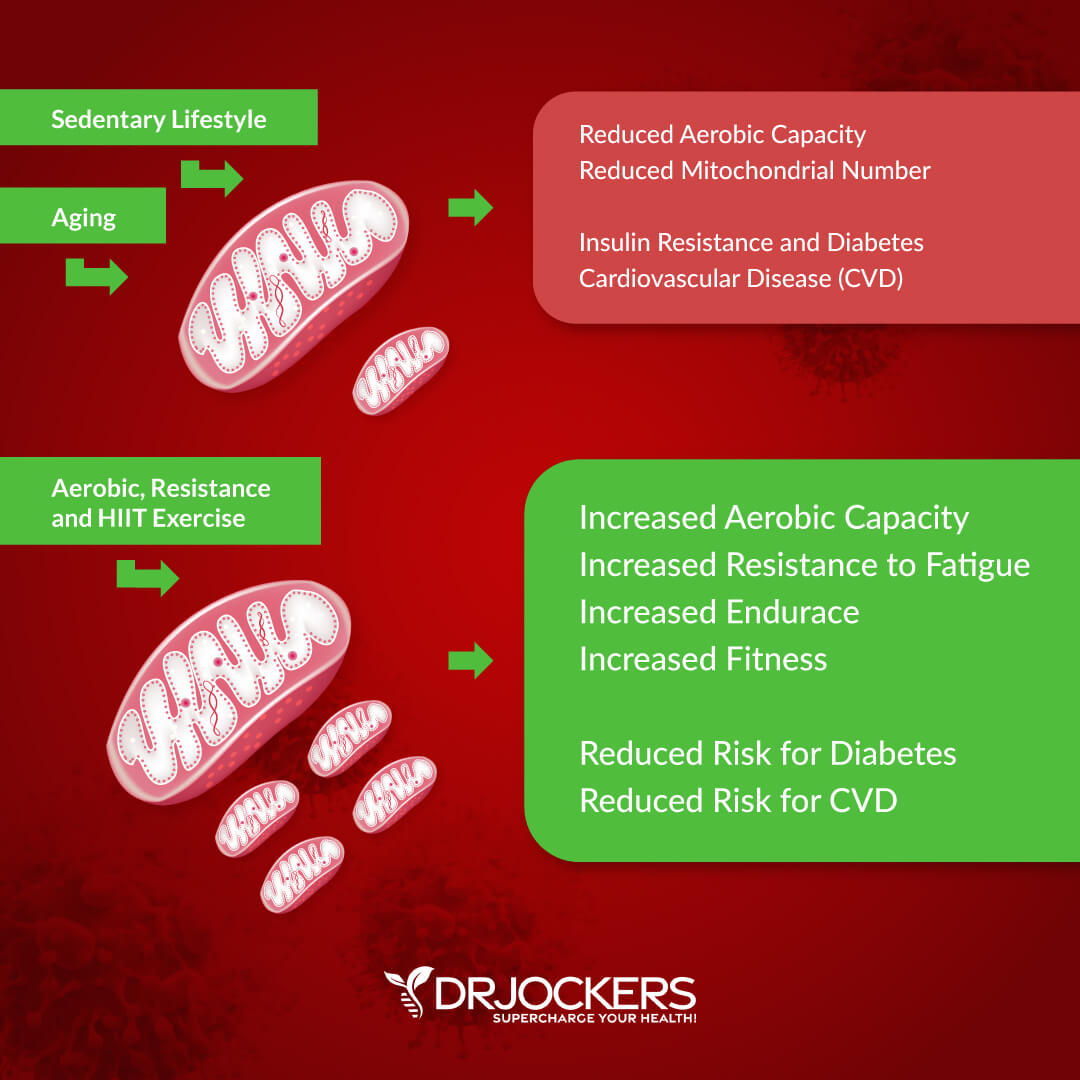
A study found that interval training resulted in a 49 percent increase in mitochondrial capacity in younger volunteers and a 69 percent improvement in older ones.
This is particularly important since the aging process can decrease your body’s ability to make mitochondria. Hence, it seems that exercise can slow this process and better your mitochondrial function even later in life (19).
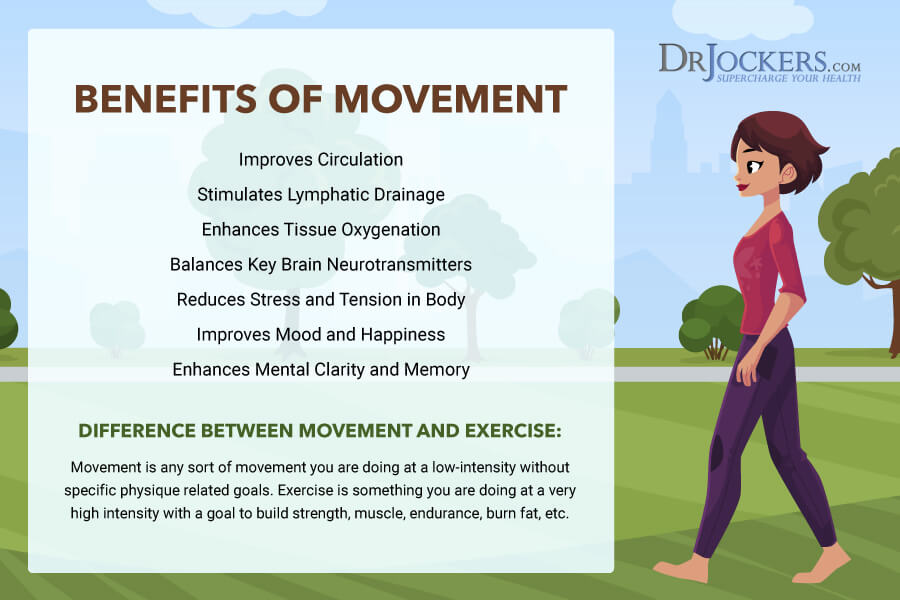
Reduce Stress and Improve Sleeping Habits
People with mitochondrial problems often experience fatigue which may also lead to further symptoms and health problems. Reducing stress and improving your sleeping habits becomes particularly important if you are experiencing symptoms related to mitochondrial issues.
Chronic stress can increase inflammation, reduce immune function and increase fatigue. All of this can increase your risk of mitochondrial problems and related symptoms. Regular meditation, breathing exercises, mindset strategies, and therapy can help you respond to stress better. Journaling, coloring, yoga, exercise, time in nature, and uplifting activities can help you lower your stress levels and uplift your mood (20).
According to research, less than seven hours of sleep per night can result in the reduction of mitochondrial DNA in the blood as well as poor cellular function. Even short-term sleep deprivation can result in mitochondrial dysfunction and oxidative stress.
To improve your mitochondrial function, make sure to sleep 7 to 8 hours per night regularly. Developing a regular sleep/wake schedule and a relaxing night-time routine can help you fall asleep quickly and to obtain quality sleep throughout the night (21, 22).
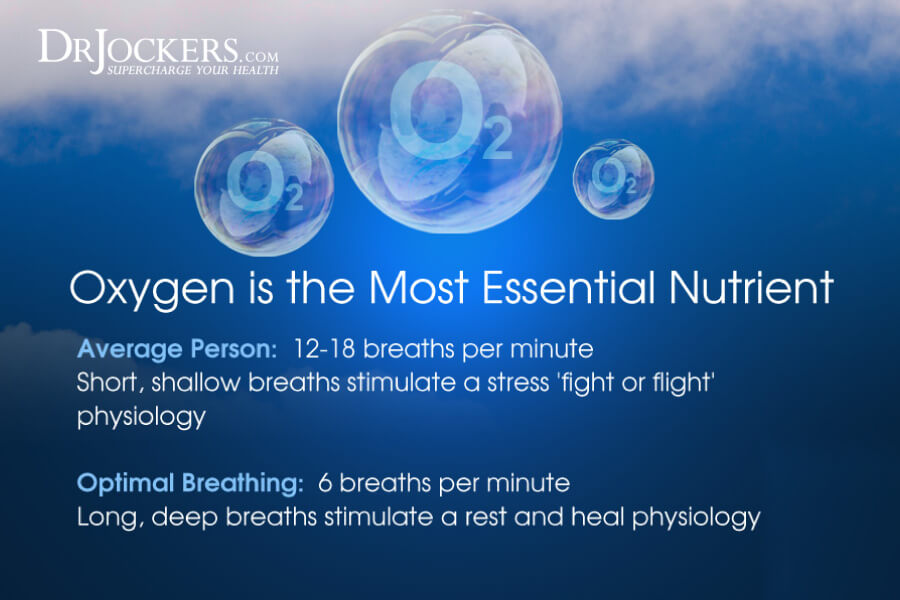
Intermittent and Extended Fasting
Intermittent and extended fasting can be incredibly beneficial to improve your mitochondrial health. When you are fasting, damaged mitochondria become purged through a process called autophagy or specifically, mitophagy.
Autophagy plays an important role in maintaining the mitochondria. This process allows the mitochondria to remove damaged and unwanted debris, accumulated reactive oxygen and nitrogen species and unfolded proteins which lead to virus-like problems (23, 24).
Research has also linked calorie restriction and fasting to improve mitochondrial function, better health, and increased longevity. Fasting can reduce oxidative stress byproducts and increase oxygen efficiency while maintaining critical ATP production (25, 26).
While extended fasting can be beneficial, if you are worried about going hungry for days, intermittent fasting is a fantastic option for you. You can learn about the benefits of intermittent fasting and my favorite fasting strategies here.
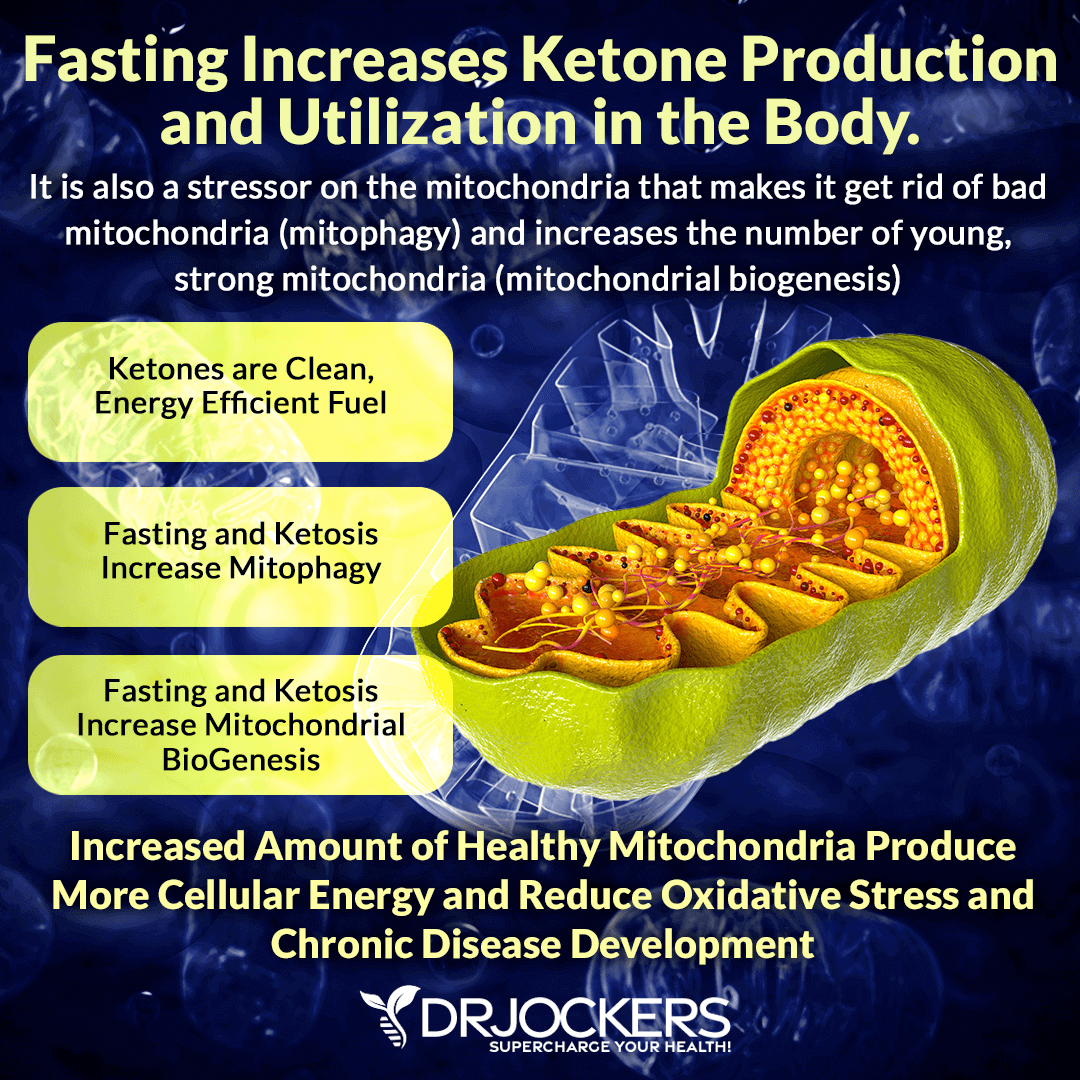
Use Red Light Therapy
Red light therapy (RLT) is a low-level laser therapy that is a form of photobiomodulation. Photobiomodulation refers to using light to modulate our biology. This process exposes your body to low wavelength red lights that penetrate deep into your skin. Unlike ultraviolet (UV) rays from the sun, RLT is safe and doesn’t burn your skin.
You won’t get a tan or get a sunburn, instead, you receive all the benefits of the red light deep inside on a cellular level when standing or sitting several inches from an RLT device. This process may help to increase cellular energy and antioxidants in your body.
Research has shown that through red light therapy, the mitochondria in the skin cells are able to soak up the beneficial light particles, create more ATP energy, and able to fuel all cells with energy with it. Since your body is able to use this extra energy for rejuvenation and repair, this energy provided to your cells may contribute to many of the positive benefits of RLT (2).

Use Key Mitochondrial Support Nutrients
One of the best ways to ensure mitochondrial health is to use key beneficial mitochondrial support nutrients such as CoQ10, L-carnitine, B vitamins, magnesium, ALA, creatine, resveratrol, curcumins, and D-Ribose. You can find all of these nutrients in Mito Support™, a supplement designed to support efficient mitochondrial metabolism and ATP energy production.
First, let’s look at the benefits of each key mitochondrial support nutrient. Then we will learn about how you can use them separately or as a combination for optimal mitochondrial health.
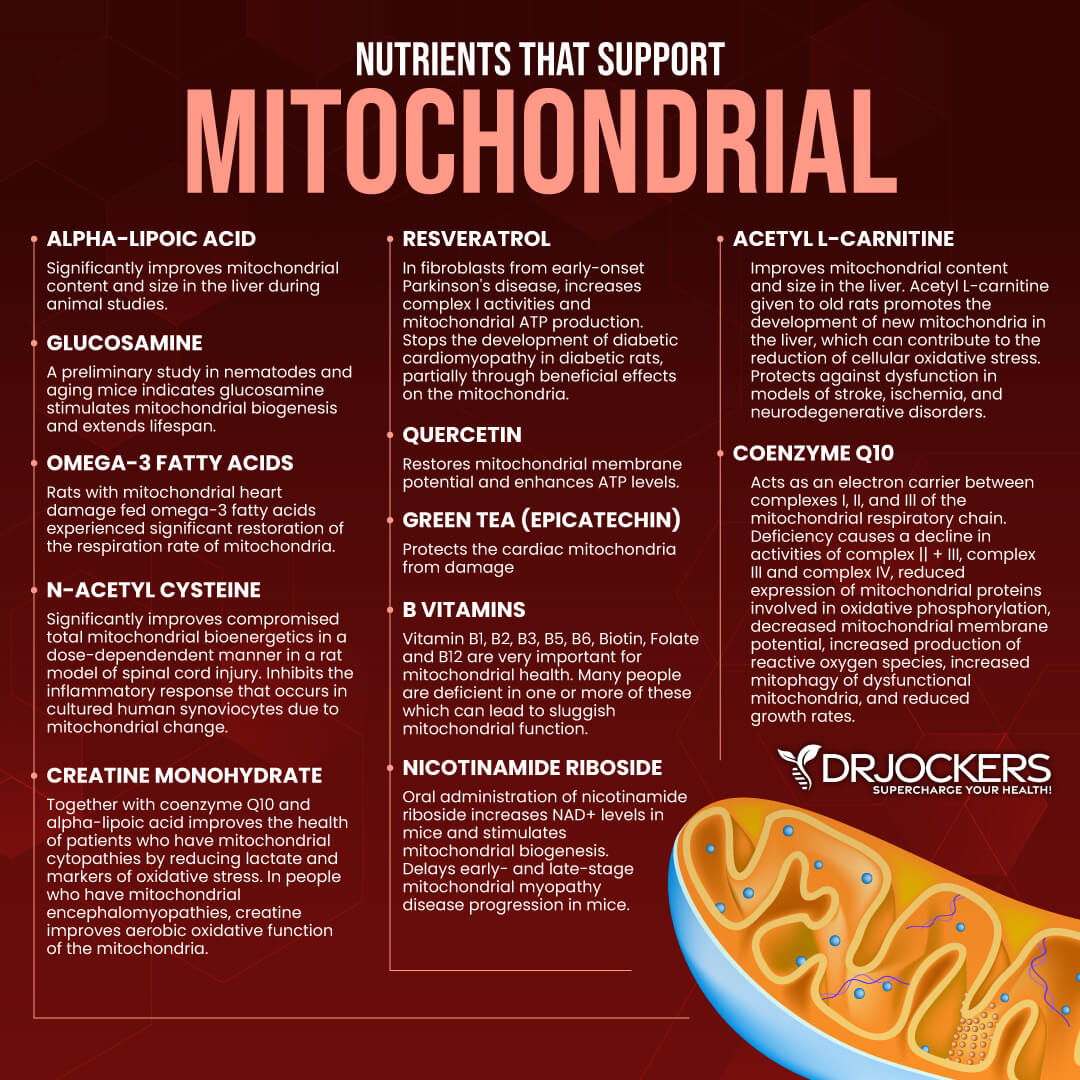
CoQ10
Co-enzyme Q10 (CoQ10) is a powerful antioxidant that plays an important role in your overall health. COQ10 supports your body’s fight against oxidative damage and protects the cells of your organs such as the heart, pancreas, liver, and kidneys. Low levels of CoQ10 are associated with many diseases. It is more than an antioxidant, it supports important functions in your body, including energy production inside your cells. It is an essential component of the electron transport chain within the mitochondria and necessary for the synthesis of ATP (27).
Naturally, it can be found in pasture-raised chicken or beef, liver, heart, and kidney, fish, dairy, some fruits, including strawberries, grapefruit, apples, avocadoes, black currants and certain vegetables such as broccoli, cauliflower, sweet potato and in nuts, seeds, and extra virgin olive oil. You may also benefit from supplementation through Mito Support™.
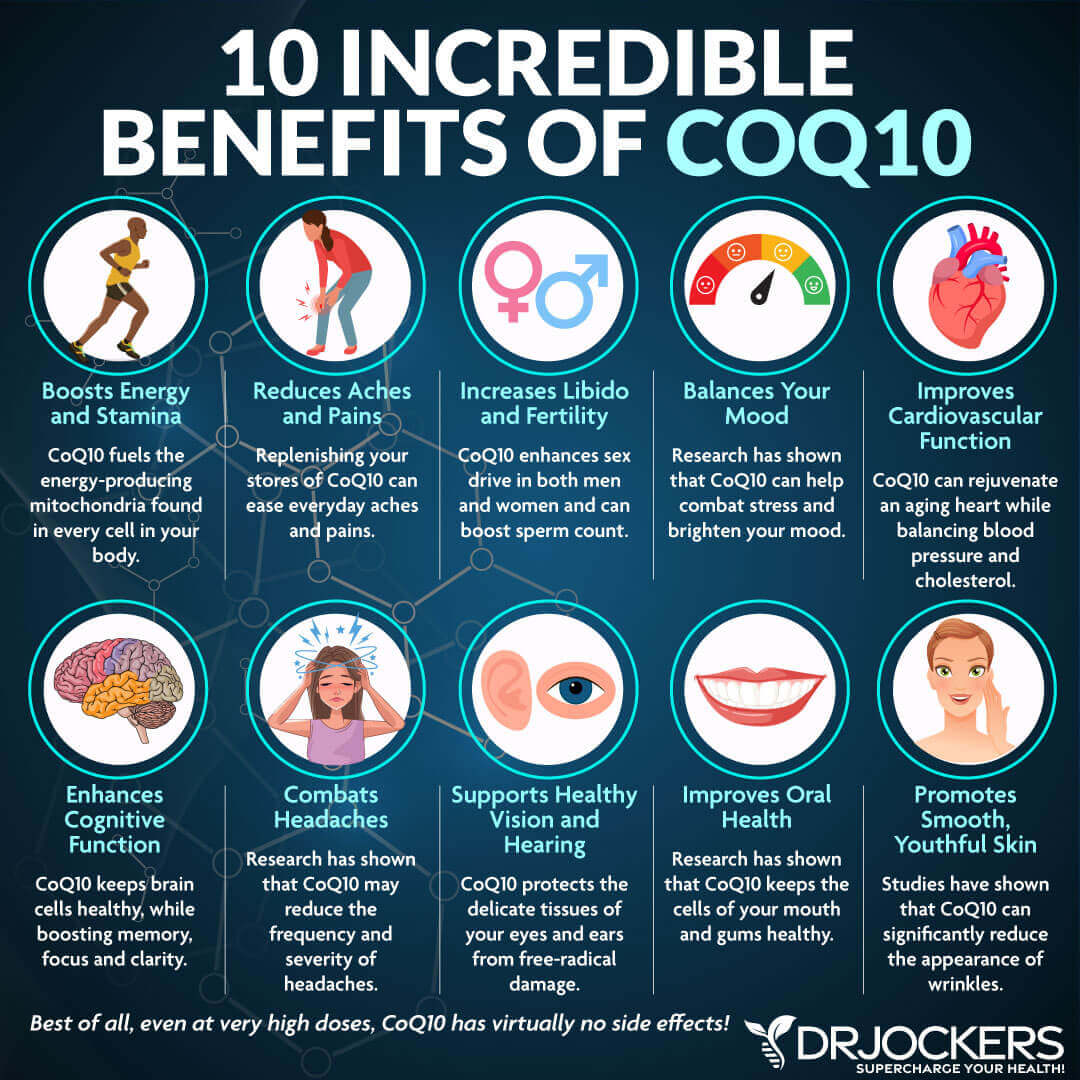
D-Ribose
D-Ribose is a specific form of sugar that your body produces naturally. It plays an important role in energy production in the form of ATP, and for increasing muscle energy, and by being a building block of RNA. It can increase your energy, improve sleep, lower pain, and improve mental clarity (40).
D-Ribose is often recommended for people with chronic fatigue and fibromyalgia. D-Ribose can be found in poultry, beef, eggs, dairy, and mushrooms. However, you cannot meet all your D-Ribose needs through food alone. Taking Mito Support™ can help you enjoy the benefits of D-Ribose.
L-Carnitine
L-carnitine is an amino acid that helps to transport compounds and stimulates the production of glutathione. It is naturally produced in your liver and kidneys. It is found in your heart and skeletal muscles where it plays an important role in energy production and detoxification. It is also found in your brain and in male sperm cells.
L-carnitine is most commonly found in red meat. The best sources of this amino acid include meat, fish, raw eggs, milk, raw cheese, other animal products, tempeh, and avocado. Supplementation with L-carnitine through Mito Support™ can be beneficial for your mitochondrial health (28, 29).
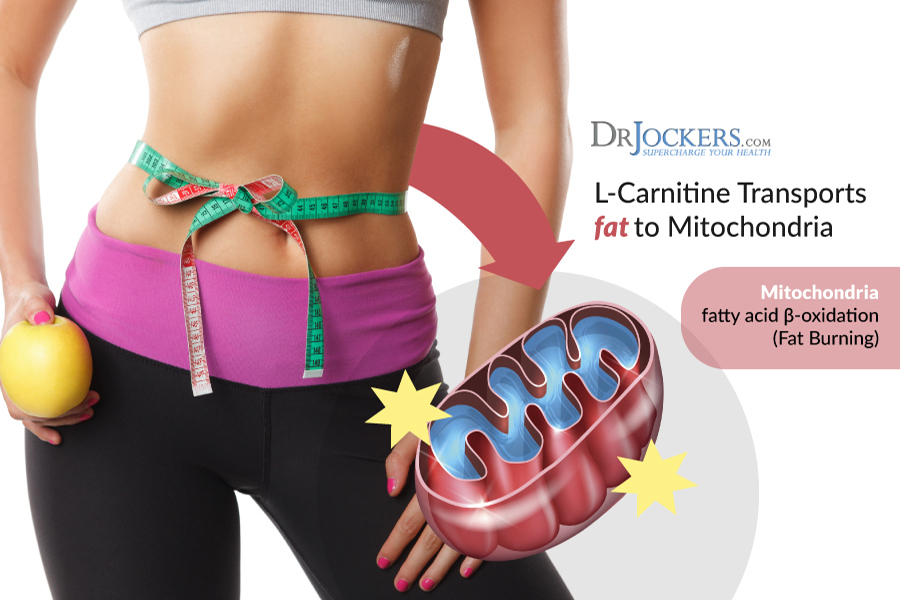
B Vitamins
B vitamins are essential vitamins that play an important role in your overall health. They help support your overall energy, cellular health, digestion, mental clarity, healthy nerve function, hormones, cardiovascular health, muscle tone, and growth of red blood cells (30).
B vitamins are naturally found in liver, kidney, meat, fish, shellfish, dark green vegetables and in whole grains, beans, nuts, seeds, and fruits. You may also benefit from supplementation. If you are supplementing with B vitamins, it is important to look for activated forms of B vitamins, such as methyl-B12 instead of Cyanocobalamin B12 when looking for a B12 supplement, P-5-P forms in B6, and Riboflavin – 5 Phosphate in B2. Mito Support™ only includes activated forms of high-quality B vitamins.

Magnesium
Magnesium is a crucial mineral that plays an important role in over 300 enzymatic reactions within your body, including transmission of nerve impulses, metabolism of food, and synthesis of fatty acids. It is important for energy, calcium absorption, muscle, and bone health and also supplies relief from PMS and anxiety and further helps to prevent heart disease, diabetes, and migraines.
The best food sources of magnesium include cashews, almonds, sunflower seeds, peanut butter, broccoli, black beans, bananas, and oatmeal. However, since our soils are depleted, it is difficult to meet all your magnesium needs through the food we eat and hence, supplementation is necessary. Mito Support™ offers 100 mg of magnesium to meet 25 percent of your daily requirements.
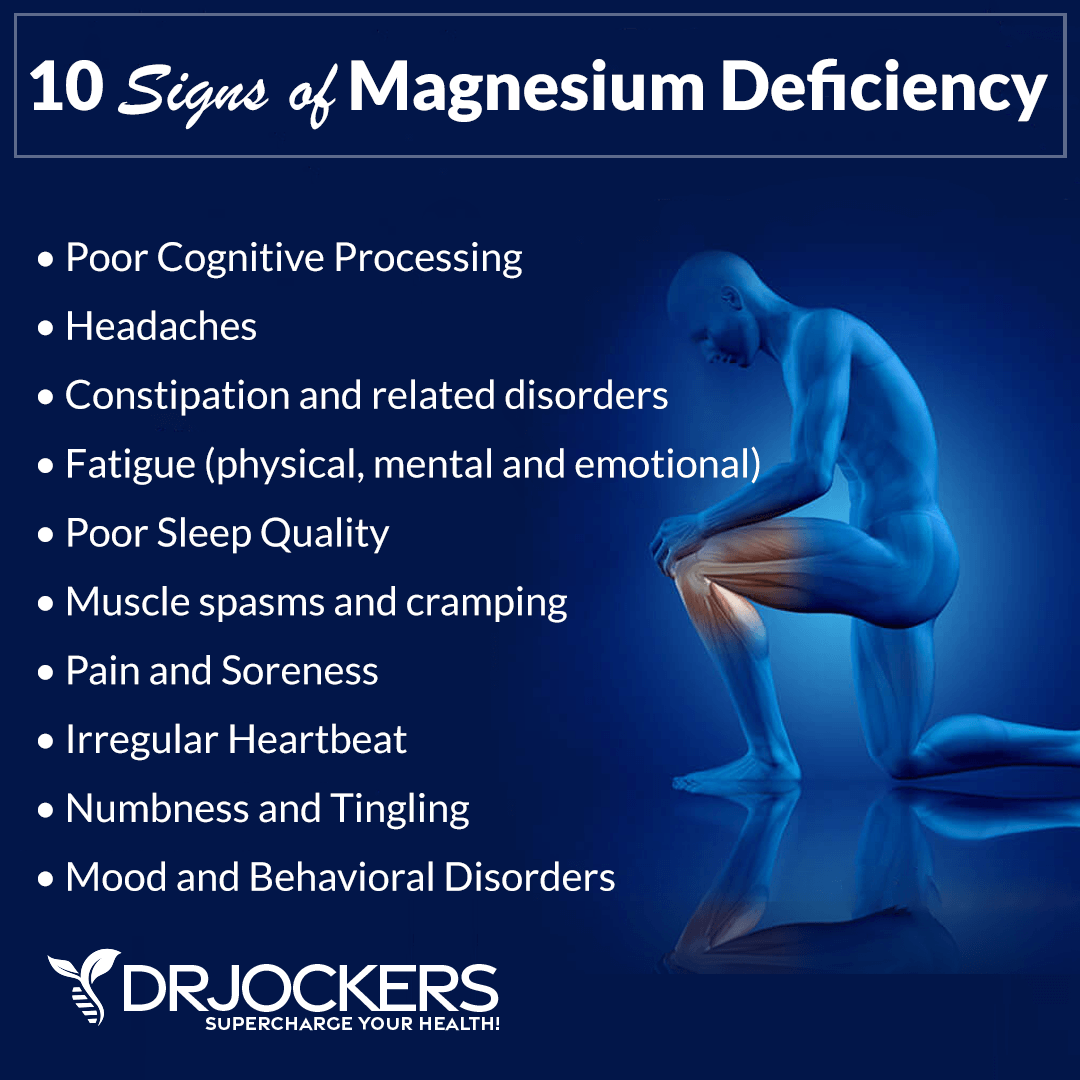
Alpha Lipoic Acid
Alpha Lipoic Acid (ALA) is one of the most powerful nutrients available. It can help to reduce inflammation, to stabilize your blood sugar, and to improve cellular energy.
ALA is a naturally occurring antioxidant that can be found in organ meats, such as liver, heart, and kidney from grass-fed animals, and fruits and vegetables, including spinach, broccoli, potatoes, and tomatoes. To receive the full benefits of good mitochondrial health, you may benefit from supplementation. Utilize Mito Support™ and add 100 mg of ALA to your daily diet.
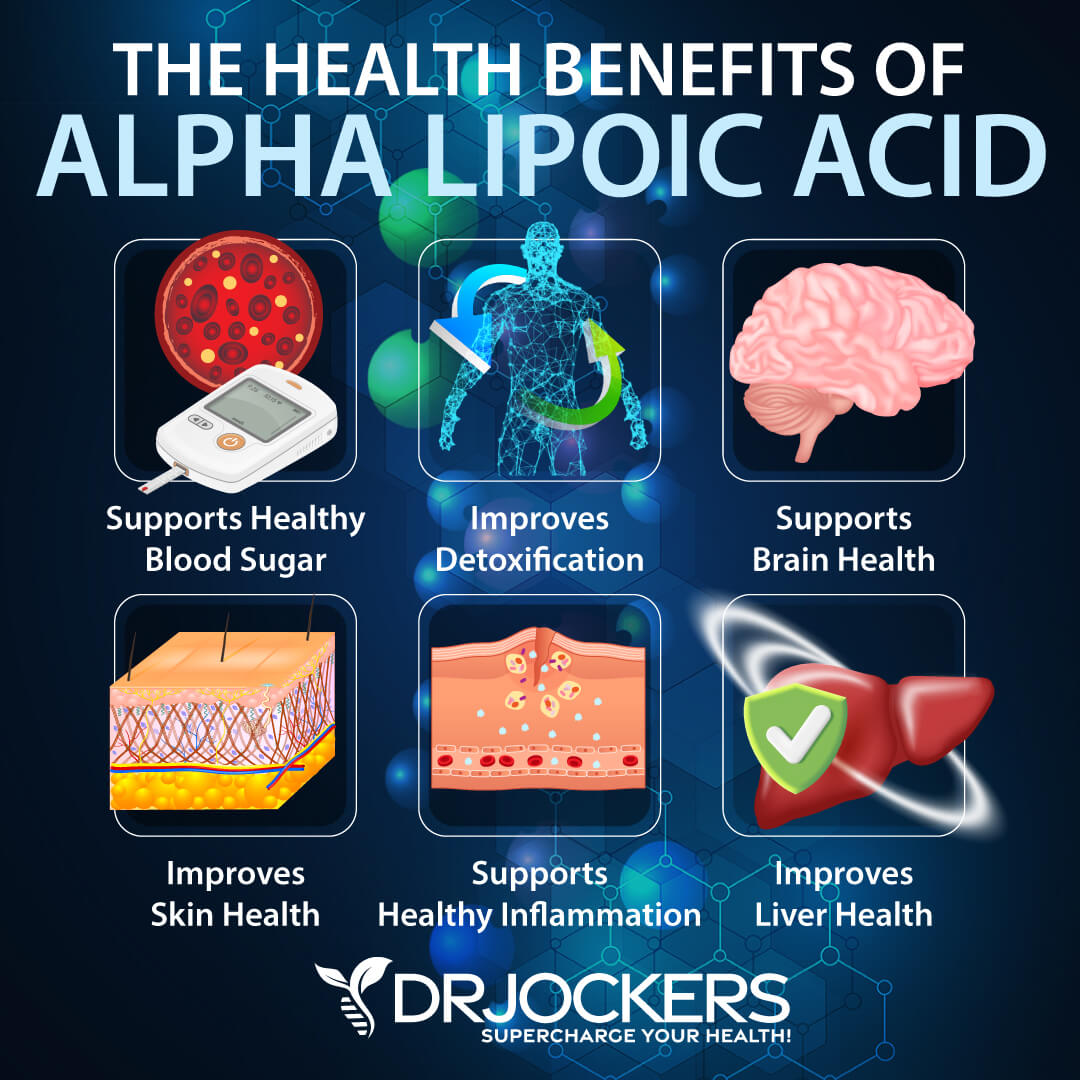
Creatine
Creatine is a substance similar to amino acids naturally found in muscle cells. It can increase your muscle mass, strength, exercise performance and protect against neurological diseases (31, 32, 33).
It is a commonly used supplement, especially among athletes. If you are looking for high-quality creatine in a supplement, then Mito Support™ is a good choice with 550 mg of creatine inside.
Resveratrol
Resveratrol is an astonishing nutrient, a poly-phenolic antioxidant naturally found in grape skin and seeds and in some berries. Its benefits include improving mitochondrial function, promoting anti-aging, protecting the brain and nervous system, enhancing detoxification and preventing cancer, metabolic conditions and heart disease (34).
You may benefit from resveratrol and this is why we have added 100 mg of it to Mito Support™.

Curcumin
Curcumin is a powerful antioxidant. It is the active compound of one of the most potent anti-inflammatory herbs, turmeric. It holds an abundance of health benefits, including reducing inflammation and pain, improving diabetes, ulcerative colitis, osteoarthritis as well as preventing and fighting cancer (35, 36, 37, 38, 39).
It is easy to add curcumin to your daily diet through cooking with turmeric, but supplementation is a smart idea.in order to benefit from a full dose of anti-inflammatory goodness. Mito Support™ provides a powerful dose of high-quality curcumin to boost your mitochondrial health.
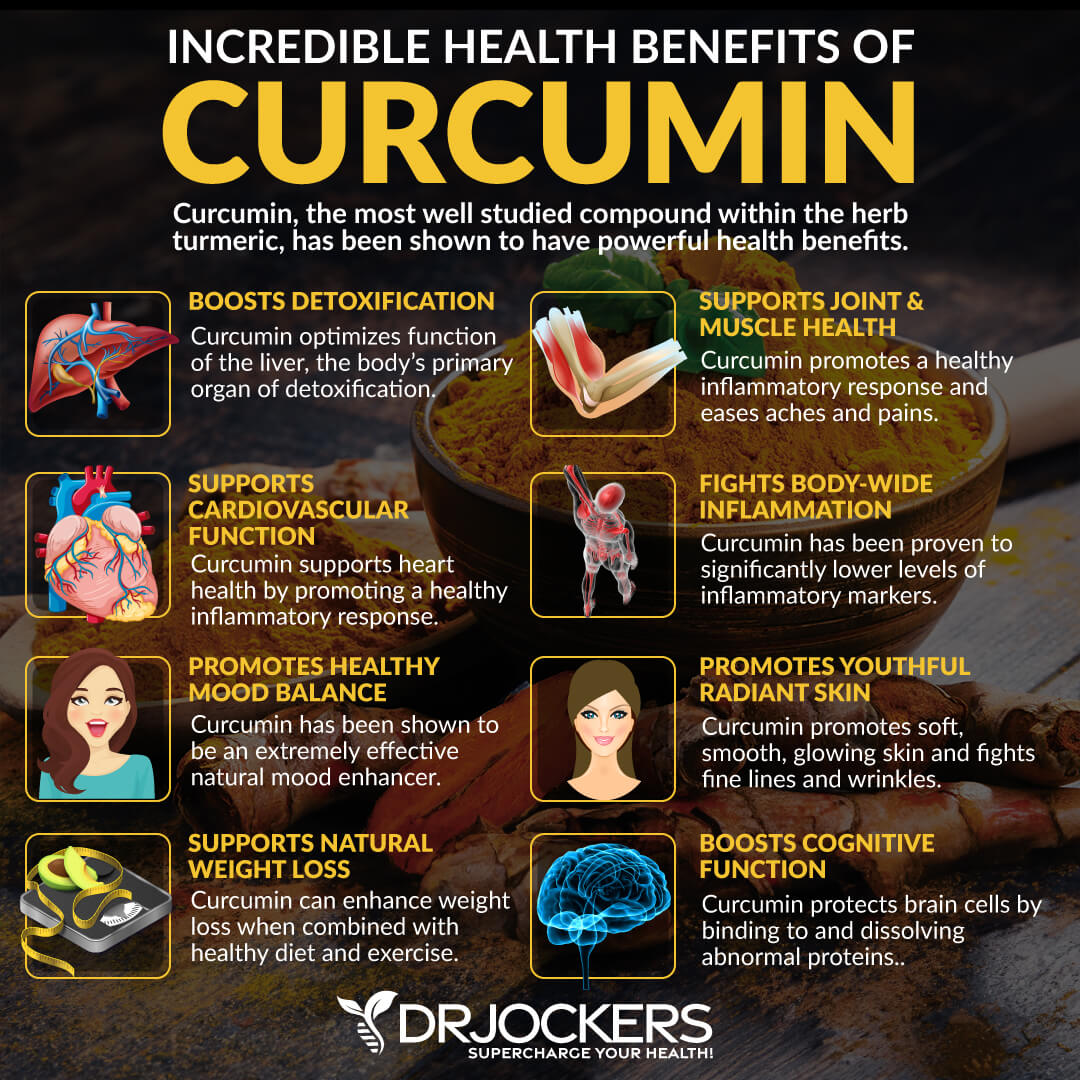
Benefits and How to Use Mito Support
Mito Support™ is a formulary blend of nutrients, nutraceuticals, botanicals and Krebs cycle intermediates, including CoQ10, L-carnitine, B vitamins, magnesium, ALA, creatine, resveratrol, curcumins, and D-Ribose. It is my favorite supplement to support the function of the mitochondria.
Mito Support™ is designed to support efficient mitochondrial health and ATP energy production. It is a fantastic choice if you are looking to promote overall cellular and tissue vitality and health while increasing your energy and boosting your athletic performance.
If your lab results show biomarkers for poor mitochondrial function, these products may be a great choice. It is a fantastic product for anyone over 40 years to support their overall health, as well as for individuals with chronic fatigue and cardiovascular health issues. For a normal dose, take two capsules twice a day, and for an advanced dose, take four capsules twice daily.
Final Thoughts
The mitochondria are the powerhouse of your cells that serve a variety of functions and help to create health in your body, including energy production and cellular energy. Poorly functioning mitochondria can increase your risk of disease and can result in fatigue, muscle aches and pain, digestive problems, respiratory problems, and other symptoms.
Mito Support™ is a fantastic supplement that supports efficient mitochondrial metabolism and ATP energy production. It is made with key mitochondrial support nutrients, including CoQ10, L-carnitine, B vitamins, magnesium, ALA, creatine, resveratrol, curcumins, and D-Ribose. Regular supplementation with Mito Support™ can improve your mitochondrial health, overall cellular and tissue vitality, energy levels, and overall health.
If you want to work with a functional health coach, I recommend this article with tips on how to find a great coach. Our website offers long-distance functional health coaching programs with our expert practitioners. For further support with your health goals, just reach out and our fantastic coaches are here to support your journey.
Inflammation Crushing Ebundle
The Inflammation Crushing Ebundle is designed to help you improve your brain, liver, immune system and discover the healing strategies, foods and recipes to burn fat, reduce inflammation and thrive in life!
As a doctor of natural medicine, I have spent the past 20 years studying the best healing strategies and worked with hundreds of coaching clients, helping them overcome chronic health conditions and optimize their overall health.
In our Inflammation Crushing Ebundle, I have put together my very best strategies to reduce inflammation and optimize your healing potential. Take a look at what you will get inside these valuable guides below!






Fantastic Information thank you.
PQQ is in vegetables/tea etc may help multiply mitochondria or a person may take 20mg of PQQ in a supplement. Chemicals may poison the mitochondria and hurt the DNA…avoid smelling paint/antifreeze/chemicals in food/lotions/shampoo etc..that may hurt mitochondria.
Thanks for sharing Shasha!!
I have heard that COQ10 is not utilized well without PQQ. Why is it not in your Mitochondrial Support Formula?
Hey Devaki, No, supplemental CoQ10 is utilized quite well by the body. There are over 100 studies showing this. PQQ is a relatively new form with just a few studies but marketers have tried to use the idea that you need this ingredient in order to sell their products. It is possible that is is very good, but it doesn’t disqualify the body of evidence that supplemental CoQ10 is very helpful.
Antibiotics/Chemo/drugs may hurt mitochondria. Mitochondria maybe ancient bacteria so if you try to kill an infection you may hurt mitochondria also. Lyme people may take so many things to kill off the Lyme it kills the mitochondria and some may die. Protect your mitochondria. Strong probiotics may help and ozone for infections. Herbs may not hurt as much as antibiotics.
Here’s the worst that Dr Jockers didn’t mention. Proton Pimp inhibitors. Where are the most abundant proton pumps? Not the stomach. The liver, brain, muscles, heart. And what organelle has the most Proton Pumps? The mitochondria. So while we are having an increase of mitochondrial damage, at the other end, allopathic doctors are handing out PPI’s like candy even to patients who HAVE NO STOMACH PROBLEMS. How do I know? I am a nurse and have spent too much time handing these evil pills out, only to find out there are patients that have no need for them. Why do doctors do this? I have no idea. Are they getting kickbacks on these horrible meds? i don’t work on that end of the paperwork so I don’t know, but I suspect so. Look at the patient comments at the Peoples pharmacy dot com, there are people that kill off so many of their mitochondria with these meds that they die. I myself am trying to get off these things, not GERD but duodenal ulcer since 2009, it simply won’t heal and I have been on this PPI since 2015 and I am near the end because of it.
Thanks for sharing! Yes PPI’s are a big issue!
I had Gastroparesis at one point and they put me on PPis! I found that they made me sicker and I thought I was gonna die so i cut off doctors and medications completely and did the research myself and healed! Big pharma can suck it. Im done with that crap.
A very educational article, mostly based on medical science. This hots right to the core of bio-nutrition by focusing on Mitochondrial health.
Enlightening enough, as I am very much interested in the interaction of various amino acids and their benefit to one’s overall health. Thank you for such a useful read.
Thank you Enrique!
MS people may have mitochondria issues…..
MS can be due to gluten which can cause low nutrients absorbed/low thyroid/liver builds up heavy metals. MS people may have hurt mitochondria they inherit from their mom and from antibiotics etc. Fixing the root cause may help MS people heal fast. Low sunlight heritage may cause low energy to the immune system and it may attack the brain/body/gut lining/glands/cause gluten etc issues. Genova test show mitochondria steps. Genova tests are for hormones/vitamins/allergies. Zyto scan shows infections and how organs/glands are working. Hair test shows good mineral levels/heavy metals. Blood tests may not help since they don’t tell what is in the tissues and ranges maybe off.
Amour thyroid gives energy to the mitochondria. Levothroxine may not help since T4 may not change to T3 without Zn/Se/enough iron/probiotic. Many people don’t get the right dose of thyroid medicine or no thyroid medicine. Many MS people don’t get thyroid medicine maybe due to a strange TSH, but the pituitary gland that makes TSH may also be hurt. MS people may get cooling suits/statin drugs/antidepression drugs instead of thyroid medicine. They may get an MS drug that suppresses the immune system which may lower attacks, but allow infections.
MS people may heal fast with natural help. LDN may help block hidden gluten and help the immune system not attack and is less then $1 a day. LDN may help 99% of MS people. NO gluten/dairy/soy/sugar/GMO/food with a label..taking vitamins/good oils/minerals..probiotic…LDN..detoxing may help MS and much more. No gluten/GMO may help intestines absorb more nutrients that help rebuild cells to work right in the brain/body. MS people are helped by exercise which makes more mitochondria. Use it or lose it. Sugar slows mitochondria and lowers the immune system. People may crave gluten which is like Heroin to the brain and sugar is is cocaine so may not want to stop eating it. MS people may heal fast, but many don’t change their diet and just take a $5000 a month drug that may keep them disabled. Coenzyme Q10 is the spark plug for the mitochondria. Alpha lipoic acid/Mg/Cr/oregon grape root helps blood sugar. Carnitine/acetyl carnitine may help fatty acids get into the mitochondria. Saturated fat hurts me. Coconut oil is a medium chain fatty acid which may speed up mitochondria. PQQ is in green tea/oolong tea and vegetables. Vegetables feed probiotics. HCl and enzymes at meals may help food digest. Orthobiotic before a meal may help get the good bacteria in the large intestines that multiply B vitamins/make neurotransmitters. Coenzymated B vitamins may help B vitamins work better that help oxygen burning. B vitamins/fish oil/Mg/Zn/evening primrose oil/lecithin/Nature’s plus- Source of life multiple and more may help.
Chiropractors/acupuncturists etc may help with supplements/hair tests/detoxing/diet. Vit B12 methylcobalamin shot helped more than under the tongue kind/creams/intrinsic factor kind. Vit B12/progesterone may help myelin/bones and thyroid/adrenals etc. Vitalogic- Adrenal formula is recently helping me with ginseng/licorice/MACA.
MS people maybe hurt by gluten/hurt by chemicals/infections/Lyme/ heavy metals etc. and have hurt mitochondria/gut lining/thyroid etc. The gut lining is the 2nd brain. Killing infections may kill mitochondria which are ancient bacteria. Herbs may help instead of antibiotics. Protecting the mitochondria is needed and helping them. People with addictions may have gluten issues. Smoke/alcohol etc may hurt. Craving chocolate may mean they are craving Mg which helps mitochondria. MS people can learn how to take care of their health and may heal fast with natural help.
Thanks for sharing Shasha! You are correct. People with MS frequently have impaired ATP synthesis due to poorly functioning mitochondria. I write about it in this article: https://drjockers.com/mitochondrial-dysfunction-disease/
Intermittent claudication (IC) is a condition which causes it to be pretty much impossible to walk long distances without stopping to rest because of excruciating leg pain. It is a common side effect of statin drugs, which I was prescribed after my heart attack over eight years ago. Prior to my heart attack and again as soon as a few weeks after it, I had no problem walking 5 miles nonstop, which I did 3 or 4 times per week. Unfortunately, by the time I figured out what was going on and ditched the statins after 8 or 9 months, they had caused IC so bad that a quarter mile nonstop was the best I could do. I have very recently learned that statins are known to damage mitochondria, and that damaged mitochondria can cause IC.
As of 5 weeks ago, after several years of zero meds, healthy eating and as much exercise as I could stand, I had gotten my maximum nonstop distance back up to half a mile. I figured that the damage the statins had done was permanent and I would simply have to live with IC for the rest of my life.
I had been taking a CoQ10 supplement for many years, but a few weeks ago I picked up some PQQ+CoQ10 (PQQ+), which the manager at a health food store told me was supposed to be like “CoQ10 on steroids,” so thinking in terms of my heart health in particular I decided to give it a try. Much to my astonishment about two weeks after that my legs were feeling so good that I was able to walk one entire mile nonstop, a week after that two miles, and a week after that five miles, nonstop! Astonished as I was by the quick turnaround I tried to figure out what might have caused it, and couldn’t think of anything but the PQQ+ as a likely candidate. It can’t be a placebo effect because I never made the connection until after the IC was already gone. I guessing that damaged mitochondria caused the problem in the first place, and PQQ+ is now repairing that damage. I hope that everyone who suffers from IC can hear about this and at least give PQQ+ a try.
Hey Greg, I am so glad to hear about your healing journey! Thank you for sharing! Blessings!
This was very helpful. I’m on PPI’s (Lisinopril) and Atorvastatin (Lipitor). I had surgery to remove two cancerous polyps last year. The cancer team asked how long I had been taking PPI’s, saying there were study’s showing a connection with cancer. But since I have Bradycardia and left ventrical hypertrophy I’m not sure what getting off themeds would do to me. Kind of scary.
Hey Avon, I am so sorry to hear! I would recommend that you speak with a functional health practitioner who will customize a plan specific to your health needs and goals! This article can help.
I appreciate your sharing your story as well. I have never noticed a difference taking CoQ10 or even liquid ubiquinol but I will try once more with this additional activator, PPQ.
thank you so much for all the Detailed Information .. really very helpful for better understanding the processes etc…
i have one question regarding the grassfed organic meat /products
what cpuld one do when one cannot financiall afford all the organic foods especially the meat vegetalbles.. itsveryexpensiv here .. thank you Vanessa
Hey Vanessa, I would encourage you to begin making changes that best meet your budget and your health goals. Some strategies like buying seasonally, growing your own garden, buying frozen fruits and veggies and always buying the dirty dozen organic may help! I offer some healthy alternatives in this article.
Hi Dr. Jockers, thank you for your answer and the tipps. I will try. Greetings from Germany
You’re welcome Vanessa! Blessings!
Is poor mitochondrial function another term for adrenal fatigue? I see that most of the symptoms are the same…do methylated Bs help fix mitochondrial energy production?
Thanks!
Hey Robyn, Poor mitochondrial health does cause an array of symptoms and can increase risk for disease. However, adrenals impact hormone function and mitochondria primarily create cellular energy. This article outlines some of the chronic diseases associated with poor mitochondrial health.
My question was: do methylated Bs help fix mitochondrial insufficiency?
Thanks, Dr. J.
Hey Robyn, Yes, as the article explains B vitamins play a critical role in mitochondrial dysfunction.
Sorry to be such a nuisance, but I didn’t see the word “epigenetic”. It seems if it is, it would be easier to treat.
Hi, Dr. J: sorry to bother you again, but I’m scared and need to know if mitochondrial insufficiency is reversible if it is epigenetic..or caused by lifelong stress. Thanks!
Yes you can heal from this!
Dr.J,
You mention toxins. I consider drugs and specifically psychoactive meds to be toxins. They are removed via specific liver enzymes as toxins are. Can you point me to information concerning repair of harm caused by prescribed psychiatric meds?
Yes I would agree. Unfortunately we don’t have info on that topic at this point but you can find that info on some other websites.
Can’t we increase our production of Glutathione-the master of all antioxidants, reducing oxidative stress in our cells? Oxidative stress seems to be the root cause of over 200 diseases and health issues!
Yes absolutely! It is super important to help improve glutathione levels.
If by saying ‘red light therapy’ you mean infrared ?
Then call it that
Hello Robert, no we are talking about red light therapy and infrared and there are devices that provide both of these: https://drjockers.com/red-light-therapy/
Hello, Dr. David!
My CHI test revealed low mito function … unrelenting fatigue the last four years that was thought to be adrenal fatigue. Q: is mito disease the same as dysfunction? Because I don’t suppose you can cure a genetic issue. If it’s dysfunction, probably cure it…am I right? I don’t know in my case, but can tell you I did not have fatigue and hormone dysfunction to deal with before 2017. The fatigue came on me practically overnight. Interestingly, clean bill of health from docs. But metabolically, i’m In lousy shape with many alarming symptoms. You say aerobic exercise is important, but how on earth can we exercise when so fatigued…can not even walk fast. I’d be into intermittent fasting, but worry about weight loss because i’m skinny. My age isn’t helping, either. Thank you for your feedback!
R😷
Sorry to hear this! I would recommend working with a functional health coach to get to the root cause: https://drjockers.com/functional-nutrition-tips-to-find-a-great-health-coach/
Oxaloacetate (I use BeneGene) reduced my fatigue and increased endurance and ability to fight gravity(walk up stairs and hills) and strength from impaired mitochondria due to CIRS/ME/CFS for years. I also use all your tips. Nano Vi, and FSM helped me go from slow walking 2 flat miles to 8.5 grounding barefoot on beach walks. Previous comments helpful too. Blessings to all.
So glad you are getting better! Blessings to you Cindy!
Thank you Dr. Joker for the information rich article.